Spring into Co-op Board Voter Mode
by the Weavers Way Leadership Committee
Welcome, members, to the 2024 election season! Elections for the Weavers Way Board of Directors began on Apr. 1. Every member-owner household can participate in this annual event that helps shape the governing body of our 50-yearold cooperative association. Exercising your right to vote is fun-
damental to the democratic principles on which cooperatives are based, so exercise that right and vote!
The overall success of the Co-op depends on your participation in this annual election. Our bylaws require that 10% of member households participate in the election, so please vote as soon
(Continued on Page 6)
The Shuttle
Community-Owned, Open to Everyone
New Director, New Chapter For Food Moxie
APRIL 2024 Since 1973 | The Newspaper of Weavers Way Co-op


 by the Board of Directors of Food Moxie
by the Board of Directors of Food Moxie

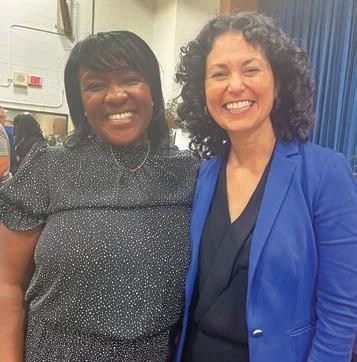
After a thoughtful search, Food Moxie is delighted to welcome Kiasha Huling as our next executive director. Our board has had the pleasure of working with Kiasha for the past year during her tenure as co-chair of the board’s executive committee. Her professional credentials and nuanced understanding of our organization, Northwest Philly and food and land justice issues uniquely position her to steward our mis sion successfully into the future.
leader. She is adept at navigating orga nizational transitions, increasing capaci ty and connecting neighbors to nonprofit missions that uplift and improve com munities. At the same time, she is aware of the challenges and the opportunities
manager there. Before the Co-op, he was a store manager at Dollar Generals in South Philly and Spring Garden.

His role: “Creating a healthy, safe atmosphere. Giving the members and the customers a great experience when they walk through those doors. Being however helpful I can be with my staff.”
Quote: “We’re neighbors. We’re not trying to come in and take over anything; we’re just here to coexist with each other.”
ARIEL LEVINE
Assistant Store Manager/Front End Manager
a lead cashier and then shifted to becoming bakery buyer. In 2023, she was promoted to assistant grocery manager in the Hill. Prior to the Co-op, she was a cashier at the Fresh Grocer in North Philly.

Quote: “It [the job] is a lot, but considering how familiar I am with the Co-op, I’m more excited than anything, because it’s a big deal. I’m mostly excited to be a part of opening this store in this community and being able to serve the people…I hope we’re able to serve them in a way they want and need.”
ASIA SIMMONS
Prepared Foods Manager
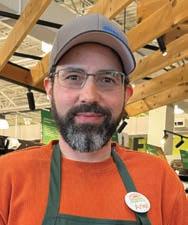
Background: He started his grocery career at 16 at the since-closed Glenside Market. He later relocated to Seattle, where he worked at Marketime Foods. He came back East and worked at Creekside Co-op, eventually becoming assistant grocery manager. After Creekside closed, he was hired at Whole Foods in North Wales (which later relocated to Spring House) and began his career as a buyer, finishing as grocery buyer in the Spring House store. Most recently, he worked as operations manager at Mom’s Organic Market in Center City.
His role: “James’ right-hand person; the person who sets the tone, the attitude and the pace for the team.”
Quote: “I think [shoppers are] going to know everything they
(includes Meat & Fish, Deli & Sandwich Station)

Background: She's a lifelong member of Weavers Way who completed culinary school at the Art Institute of Philadelphia and worked at the Four Seasons, along with several restaurants in the city. Her Co-op career began after she earned her bachelor's in sustainable agriculture from Goddard College in Plainfield, VT and did an internship at the farm. She went on to work in produce and Prepared Foods in Chestnut Hill and at the farm.
Quote: “I have the motto that it’s important for people to know where their food comes from. I have celiac disease, so it’s important for me to understand people's allergies or food choices. I’m open to questions and feedback.”


B(Continued on Page 16)
(Continued on Page 6)
Weavers Way Cooperative Association 559 Carpenter Lane, Philadelphia, PA 19119 www.weaversway.coop CHANGE SERVICE REQUESTED
Presorted Standard U.S. POSTAGE PAID Philadelphia, PA Permit No. 2658
2024 WEAVERS WAY BOARD OF DIRECTORS VOTE! Candidate profiles on pages 12 & 1 3.
Photo courtesy of Food Moxie New Food Moxie Executive Director Kiasha Huling (left) with U.S. Deputy Secretary Xochitl Torres Small at Saul High School in Roxborough last summer.
eginning soon, we will mail out sets of new member cards to every active member household. The number of cards that each household receives will be based on the number of adult members (age 16 or older) in your household. We will also VO TE!

Ihoped i’d be delivering this month’s paper to our new Germantown store — if not right when the issue comes out April 5, maybe later this month. But it looks like that’s more likely to happen in May. Bummer.
In the meantime, we’re trying to get everyone pumped for Weavers Way location #4 with mini profiles of four of the store’s department managers (p.1); regular Chestnut Hill shoppers may recognize three of them. And in this month’s Check It Out! Column (p.2), I’ve got intel on some of the local brands that will be introduced to Co-op shelves in the new store.
Of course, reading those stories will hardly take any time at all. But you can then dive into the profiles of this year’s Board candidates (pp. 12-13) before you vote. There are seven candidates for four slots this year, so you’ll have to eliminate a few.
Once you’ve voted, grab your cellphone and take a trip through QR Code Land. We have eight in this issue, not counting advertisers. If you’re curious enough (and want to avoid housework or anything else), you can:
● Look over our Passover menu.
● Sign up for our farm’s CSA or You-Pick subscription.
● Find out about our Container Refund Program
● Take a survey on whether our New Economy Incubator Committee should start a battery collective.
● Take another survey on sustainable packaging at the Co-op, join our Plastic Reduction Task Force and/or subscribe to the Philly Talks Trash newsletter.
Finished all that? Trying not to obsess about the performance of our sports teams? Remember that our Farm Market at Saul High in Roxborough is now open Fridays and Saturdays. As the weeks go by and the days get warmer, our selection of produce, flowers and local items there will increase. So while you’re waiting for Germantown’s doors to swing open, there’s a happy place to bide your time. And yeah, we have all those other stores (plus the Mercantile) to check out, too.
Catch you in the pages next month — and in Germantown eventually.
With Weavers Way Germantown set to open sometime next month (possibly earlier or later), this month’s column is geared toward products that will make their Co-op debut at the new store. Aaand here we go!
Meat & Fish
Ed Hipp’s, the Olney-based purveyor of beef and turkey products, has staked out a spot in our meat case on West Chelten Avenue. The company was created in 1975, 10 years after Ed started working in a local meat processing plant and learning the business. Look for the following items from them:
• Mild and hot beef sausage
• Mild turkey smoked sausage
• Sliced beef bacon
• Sliced turkey and turkey peppered bacon
• Turkey Canadian bacon
I only ever tried Ed’s turkey peppered bacon, and it’s a big upgrade in flavor from other brands. Their products contain no fillers, their beef comes from cattle raised in the United States, and their turkey comes from birds raised in Pennsylvania.
Wellness



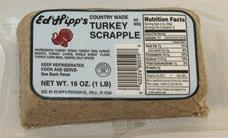
Natural Body Essentials, a Black-owned, Willow Grovebased skincare and beauty brand, will be on the shelves when Germantown opens. Their handmade products feature locally sourced ingredients where possible. Here’s what you’ll see from them:
• Growth hair serum
• Rose, eucalyptus and tea tree bath bombs
• Nourishing hair shampoo
• Honey and hibiscus leave-in hair conditioner
• Whip It! body butter (fresh herb and turmeric)
• Brown sugar body scrub
• Refreshing rose water toner
• Moisturizing beard balm

6 YEARS
by Kieran McCourt, Weavers Way Ambler
Green garlic is a scallion lookalike from immature, soft-neck garlic. It differs from garlic scapes, which are harvested from hard-necked varieties. They’re often picked when the garlic plantings need to be thinned to allow full growth for a traditional harvest in summer. While still garlicky, green garlic is milder and sweeter and lacks the bite of mature cloves.
While it’s around, green garlic is great to mix into any springtime recipe. You can mix and match it with other spring favorites like peas or asparagus. In addition, aside from the root stem and woodier parts of the green tops, the whole thing can be used in any recipe in which you’d use garlic or scallions.
It works great when pureed or minced into a dressing or sauce. Herb sauces like chimichurri, salsa verde, or gremolata are all great places to swap it in. You can whip up an unusual aioli with the white

• HIS beard oil
• Lavender and orange bath salts
Another newcomer in wellness is Phoenixville’s Bamba Soap Co., which makes handcrafted bar soap with no synthetic ingredients. Kenza and Joe Bamba elevated their pandemic soapmaking hobby into a business in 2021. The Germantown store will carry their fourounce bars in orange lavender, peppermint eucalyptus, lemongrass turmeric and pine fir.
Prepared Foods (Fresh To Go)
Salam Café, the Black-owned, Middle Eastern and Ethiopian café and market on Greene Street in Germantown, will stock their sides and injera (a pancakelike Ethiopian flatbread made from teff flour) in G-town’s grab ‘n’ go section. Look for containers of their braised beets, cabbage and carrots, carrots and green beans and spicy lentils in the new store.
In other food news, the deli in Mt. Airy has added Pantaleo aged goat cheese to its case. It has been made in Sardegna, Italy since the 1960s and is produced for only half the year. With that schedule, it may not be around for long, so act now! It has a robust, sweet salty flavor and clean, floral finish. Get it while it lasts for $27.99 a pound (FYI, my piece cost a little under $9).
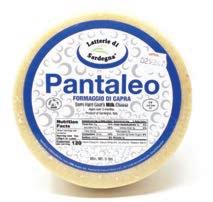
The Greening o’ the Garlic
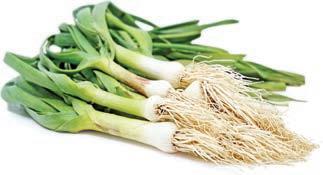
and tender green stalks or add it to a favorite green goddess-style dressing.
Like scallions, thinly sliced green garlic can be used as a last-minute garnish to numerous dishes. And it can be thrown into a salad or stirred into warm grains or light soups to beat back spring allergy sniffles.
It mellows even further when cooked, and can be stir fried, sautéed or even braised in oil. The stalks should be trimmed and can be braised in oil alone or with ingredients like fennel and cherry tomatoes.
Since green garlic is only around for a short time, you may want to pickle it if you can find it. It can add extra flavor to any springtime pickle, but is also delicious on its own — it just has to be trimmed to fit inside a jar. It can also be combined with such springtime pickling stars as asparagus or green beans.
2 THE SHUTTLE April 2024 The Shuttle is published by Weavers Way Cooperative Association. Statement of Policy The purpose of the Shuttle is to provide information about co-ops, healthful food and other matters of interest to Weavers Way members as consumers and citizens. Weavers Way members are welcome to submit articles (about 500 words) and letters to the editor (200 words) on subjects of interest to the Co-op community. No anonymous material will be published; all submissions must include an email or phone number for verification. The Shuttle retains the right to edit or refuse any article or letter. Submit to editor@weaversway.coop. Articles and letters express the views of the writers and not those of the Shuttle, the Co-op or its Board, unless identified as such. Advertising Advertising for each issue is due the 1st of the preceding month, e.g., Dec. 1 for January. Ad rates are online at www. weaversway.coop/shuttle, or call 215843-2350, ext. 314, or email advertising@ weaversway.coop. Advertised products or services may not be construed as endorsed by Weavers Way Co-op. Editor’s Note by Karen Plourde, Editor, Weavers Way Shuttle by Karen Plourde, Editor, Weavers Way Shuttle Check It Out!
Middle Eastern meets Ethiopian Spicy Lentil
Embrace the Newness of Spring
By Nourishing Body and Soul
by Karen Palmer, Weavers Way Ambler Wellness Buyer
As we welcome the warmth and vibrant colors of spring, it's a perfect time to renew our commitment to holistic wellness. Spring offers a beautiful opportunity to refresh our bodies and minds and embrace habits that support our well-being from the inside out. Here are some ways to enhance the season.
Mindful Eating: With the abundance of fresh produce that emerges in spring, practicing mindful eating can be particularly enriching. Take time to savor each bite, appreciating the flavors, textures and aromas of your food. Chew slowly and mindfully, allowing your body to digest and absorb the nutrients.
I recently made a change to my eating practice: I don’t read. I put my book and/or phone down, think about the journey my food took to get to my plate, and practice gratitude for every hand that played a role in my nutrition. By cultivating a deeper connection with your food, you can enhance your overall enjoyment and sense of satisfaction. And because this style of eating takes longer than when you are standing at the kitchen sink eating a sandwich, you might feel fuller and more satisfied.
For me, mindful eating starts with the environment that I create in addition to the food on my plate. I set my place with a favorite placemat and use dishes and glasses that have meaning to me. I recently added porcelain dishes and vintage glassware to my place and truly feel like the energy created from that visual delight enhances my meal, even when it’s a PB & J! Yep, that’s me drinking my rose tea from a porcelain cup with saucer, Bridgerton style! What does your place look and feel like?
Gardening for Wellness: Gardening can be therapeutic for body and soul. An AARP study of over 2,800 people found that gardening can reduce the risk of dementia by 36%. Gardening involves so many of our critical functions — including strength, endurance, dexterity, learning, problem solving and sensory awareness — so its benefits likely represent a synthesis of various aspects.
Whether you have a spacious backyard or a tabletop, cultivating a garden allows you to connect with nature, reduce stress and enjoy the fruits (and vegetables) of your labor. It pulls you into the present, allows you to focus on what’s in front of you, and offers the opportunity to shut out the world and listen to something good or the quiet of nature.
As it turns out, getting your hands dirty is literally beneficial. The Vitamin D you’re soaking in from the sun helps you fight off colds and flus. And the “friendly” soil bacteria Mycobacterium vaccae — common in garden dirt and absorbed by inhalation or ingestion on vegetables — has been found to alleviate symptoms of psoriasis, allergies and asthma, all of which may stem from an out-of-whack immune system. This particular organism has also been shown to alleviate depression, so go ahead and get your hands dirty.
Researchers are still speculating about how our immune system may interact with our brains, improve our mental health and allow us to fend off infection. So get your hands dirty, breathe in the fresh air and revel in the beauty of new growth as you nurture your own little corner of paradise. Look for a variety of gardening essentials in our stores and feel
(Continued on Page 5)
Iam the founder of merzbacher's of Germantown. It has been my honor to bake bread for you since 2013, and I am immensely grateful for your support. You all should be proud of the collective contributions you have made to the regional food economy.
My journey into the world of breadmaking began on the bus rides to a small bakery in Northampton, MA known as the Hungry Ghost. As a student at the University of Massachusetts, my weekly pilgrimage for a cookie and a loaf of sourdough was ritualistic. Often, before I made it back to my dorm, half the loaf would be gone, and the cookie but a delicious memory. If I wanted to make new friends, I’d bring a loaf to Sunday potlucks.
After graduating, I moved to Philadelphia to hone my skills as a line cook at Talula's Garden. The memory of the Hungry Ghost inspired me to recreate those sourdough loaves before, during and after my shifts. The chefs there, usually the first to point out my shortcomings as a line cook (yes, they were valid criticisms), were incredibly encouraging of my sourdough experiments. They were impressed!


Encouraged by their rare accolades, I founded my bakery, Merzbacher’s, formerly known as Philly Bread. I was determined to include a natural sourdough that echoed my experiences with the Hungry Ghost. Initially, the complexities of sourdough baking were a challenge, especially as I began to expand my team. Not everyone had the innate touch for han-
dling sourdough, and in those early days, I lacked the time and experience to train my staff adequately. So I adapted my formulas to ensure they were manageable for entry-level workers.
But in recent years, with a stable and talented team, we've managed to perfect what I had been seeking: a sourdough that could live up to my cherished memories. Despite initial skepticism from staff that it might be too difficult to achieve product consistency, we embarked on a journey of research and development. Our goal was twofold: to achieve the perfect
(Continued on Page 6)
April 2024 THE SHUTTLE 3
word
wellness
BY
APRIL 16 FOR GUARANTEED AVAILABILITY
OUR HOMEMADE BEST — FOR PASSOVER Sundown April 22-Sundown April 30
Beef Brisket in Gravy
Tri-Color Roasted Carrots
Mashed Potatoes
Matzo Ball Soup
Haroset
Bonnie’s Homemade! Gefilte Fish PICK UP DATES: APRIL 21- 30 Items available in stores while supplies last. In store items sell out fast, order ahead! Merzbacher’s Founder Takes His Sourdough Love Citywide by Pete Merzbacher, for the Shuttle
the
on
PREORDER
TUESDAY,
—
•
•
•
•
•
•
Pete Merzbacher
a Cooperative Economy with Equal Exchange
AMBLER CAFE
April 11th
5:30-6:30pm
Ave, 19002
VIRTUAL ON ZOOM Mon, April 15th

Exchange for an evening of exploration into our work with farmers and one of the critical but lesser-known aspects of our business model: the role of capital. Weavers Way and Equal have a long standing partnership that is helping to foster a and democratic economy for small farmers worldwide. how Equal Exchange is doing business differently and how make a meaningful impact in the food system. And of course, count on an ample offering of fairly traded treats and chocolate
Weavers Way Hosts: Building a Cooperative Economy with Equal Exchange




T awoL,puorG.cnI 8.evA nwotnamreG 200 P aihpledalih , PA 1 8119 w moc.puorgawoL.ww
0891-723-01 Go e moc.ecnarusnieir .sliated tcudorp dna erusnecil ynapmoc rof g941SM3202/8©3202eirEytinmednIynapmoCC E eir I ?ecnarusn
6
eirecnarusnIehtynapmocuoynacylertegE kcablamrongnihtemosdab.sneppahhtiWruoy gninniw-drawsmialc,ecivresEIREsreffouoyehtnoitcetorpa deendnaehtecivresuoylla—tcepxeataerg.ecirpy s’tahohw.eraT nraeeromtuobaEIREL e moc.ecnarusnieir lla,suruoylacolEIREtnegA.yadotc Weavers Way Hosts: Building
Join Equal Exchange for an evening of exploration into our work with small farmers and one of the critical but lesser-known aspects of our alternative business model: the role of capital. Weavers Way and Equal Exchange have a long standing partnership that is helping to foster a cooperative and democratic economy for small farmers worldwide. Learn about how Equal Exchange is doing business differently and how you can make a meaningful impact in the food system. And of course, you can count on an ample offering of fairly traded treats and chocolate tasting! RSVP to Frankie, fpondolph@equalexchange.coop IN-STORE AMBLER CAFE Thurs, April 11th
217 E Butler Ave, Ambler, PA 19002 VIRTUAL ON ZOOM Mon, April 15th 12:00-1:00pm Register for Zoom: https://tinyurl.com/ 5n9xe9wr
5:30-6:30pm
It's Time to Get a Free Tree — Or Help Care for One
by Liz Hersh, for the Shuttle
It’s tree season! twice a year — around Earth Day and Thanksgiving — neighbors fan out to plant free street trees provided by the Pennsylvania Historical Society’s Tree Tenders program.
On Saturday, Apr. 20, volunteers will gather to plant about 40 new street trees that property owners have applied for. We’re looking for volunteers, both trained and first timers, to help dig, plant and water.
For fall planting, we want to build on our spring momentum and plant even more trees — 65, we hope — and we need your help to meet this neighborhood goal. April 27 is the deadline to apply for a free street tree for fall planting, which will happen on Saturday, Nov. 23, the week before Thanksgiving. Tree applications and planting follow a six-month cycle.
The Tree Tenders program has been around for many years and is credited with helping to restore our urban canopy. Recently, West Mount Airy Neighbors formed Keep Mount Airy Green to strengthen our tree canopy in Northwest Philly throughout the life cycle of the tree. If you have an old tree, now is the time to plant a young one nearby to replace it. Our renewed effort has helped our community add nearly 250 new street trees.
Are you concerned about tree equity? Our community has streets that have little or no shade, especially in East Mt. Airy and Germantown. Volunteers have been going door-to-door to get the word out to property owners to let them know they can get free trees. We are also reminding our neighbors about the many benefits of trees for our neighborhood. They provide homes for birds, and the shade cools houses and reduces the cost of air conditioning. They also slow traffic and make the neighborhood quieter.
Smaller trees are available and don’t hurt pipes or sidewalks. Larger trees provide more shade and help

manage stormwater. Trees increase property values, improve air quality and are linked to lower crime rates and happier people. And for some, they offer pure joy.
You can apply for a free fall street tree through April 27 by completing and submitting an application at www.phsonline.org. Click on the For Neighborhoods tab, then go to Tree Programs and click on Get a Tree.
Currently, we’re looking for folks who can offer their skills in the following ways:
● Going door-to-door on the least shady blocks to inform residents and business owners about the availability of free trees and their benefits.
● Writing an article for our local media sources (or share your tree story).
● Strategizing and developing leaders for the Mt. Airy EcoLab at SEPTA’s Carpenter Regional Rail Station.
As part of the Co-op’s efforts to reduce our use of single-use plastic, customers can purchase certain items in reusable containers.
There are a variety of containers available, with different deposits required.
How the Container Refund Program Works
1 Look for labels with a CRP logo on our shelves.
2. Buy the item — the cost of the container is tied to the product.
3. Once it’s empty, wash the returnable item and take it to the Co-op; you’ll get the cost of the container refunded. All CRP lids and containers must be returned food-residue free, fully prewashed.
4. Return containers in a timely fashion to prevent the Co-op from needing to keep buying more stock, and please do not write on or sticker CRP items.
5. Spread the word to family and friends, so they can help save the Earth, too!


● Making presentations to larger groups.
● Sewing our own tree diapers to cut down on costs and equip each tree with this resource on plant days.
If you’d like to volunteer with us in any capacity, want to join our pruning club or tree checkers, need a tree tender training stipend or have any questions about our efforts, email Natalie Sloane at nssloane@gmail.com. You can become a certified tree tender and tree checker to make sure our newly planted trees are thriving at phsonline.org/events/tree-tenders-virtual-training-2024.
Liz Hersh is a member of West Mount Airy Neighbors.

April 2024 THE SHUTTLE 5 Store Prep Deli Bulk Produce Grand Total Ambler 4,486 752 1,489 2,247 8,974 Chestnut Hill 4,918 1,201 1,326 0 7,445 Mt. Airy 2,557 1,300 2,553 0 6,410 Totals Sold 11,961 3,253 5,368 2,247 22,829 Deposits Refunded 14,653 Return Rate 64% Total Containers by Department (as of January 2024) A program run by Echo Systems with support from the Weavers Way Plastic Reduction Task Force C
REFUND PROGRAM
ONTAINER
New Director, New Chapter For Food Moxie
that face her as she begins her new role. Her work ethic, her sensitivity to managing complex problems, and her dedication to food justice have been demonstrated in the past year to her fellow board members. She has supported Food Moxie through shifts and changes over the past year and is well equipped to ensure that we meet our commitments to students, staff and community members.
Most recently, Kiasha served as director of development for a national nonprofit based in Philadelphia. Previously, she served for several years as executive director of UC Green, a nonprofit based in West Philly that fosters ways of making communities green through tree planting, gardening and other cooperative ventures. Before that, she created and directed the social work program for Sayre Health Center, a University of Pennsylvania-partnered, federally qualified health center on the campus of William L. Sayre High School in Cobbs Creek. While managing health services and resources complicated by poverty, inequality and community disinvestment, she partnered with urban gardeners and created a sustainable CSA program for pre-diabetic patients and a weekly farmers' market featuring produce grown
Spring into Co-op Board Voter Mode
as you can and encourage your Co-op friends to do the same.
Your household can vote online until 4 p.m. on Saturday, May 18, which is the start of the Spring General Membership Meeting. Paper ballots are available and will be collected at our stores in Ambler, Chestnut Hill, Mt. Airy and the soon-tobe-open Germantown store. Ballots can also be sent through the mail. Ask a cashier for the location of the paper ballots and locked ballot box if you can’t find it. You can see this year’s ballot on page 13.
Our Board is responsible for assuring that Weavers Way’s general manager is working diligently toward the goals and objectives as stated in our mission and Ends, and in management’s long-term strategic and annual business plans. Your vote plays a meaningful role in the quality of oversight and guidance the Board provides to the general manager on behalf of all Co-op owners.
While the boards of most nonprofits can nominate and approve specific people to their governing entities, the board of our cooperative enterprise is made up of members who can nominate themselves as candidates in our organization-
and harvested by Sayre High students.
Kiasha received her bachelor’s degree in psychology from Temple University and her clinical/macro master’s degree in social work from Penn. Her training and experience in social work, public health and nonprofit management will serve us well and extend naturally to our mission: “From seed to supper, Food Moxie educates and inspires people to grow, prepare and eat healthy food.”
We will benefit from Kiasha’s years of organizing and planning experience with and for communities. She is an alum of the city’s Citizen Planner Institute and was previously an environmental organizer for the Clean Air Council, a community advisor to the Department of Health’s Department of Chronic Disease and Injury Prevention, a Pennsylvania Horticultural Society tree tender, and a member of as well as a gardener at the Holly Street Neighbors’ Community Garden.
Kiasha is enthusiastic about providing opportunities for the Weavers Way community to become involved with Food Moxie’s work. Expect to hear more about opportunities to volunteer at one of our sites, participate
(Continued from Page 1)
wide election. There are several members with the interest, experience and time to serve who have come forward from our 11, 000-plus membership to qualify for this year’s run.
We have seven committed candidates for the four openings on our 11-member board. You will have four votes. Please take the time to consider each candidate’s written statement and get to know each person a bit more in their free-form, twominute video introduction. Statements and videos are featured on our website along with this year’s ballot.
You already should have been emailed a prompt to vote online. Paper ballots can be cast at the stores by 8 p.m., Friday, May 17, or they can be mailed to: Leadership Committee, 559 Carpenter Lane, Philadelphia, PA 19119. They must be received by Thursday, May 16.
All online voting will end at 4:15 p.m. on May 18, but please don’t wait. We want to know before the end of voting that we’re hitting the required 10% of our membership. Election results will be announced in person at the close of the Spring GMM on May 18 and via email the same day.
(Continued from Page 1)
in committee or board work, or to contribute financially.
We are enthusiastic about this new chapter in the life of Food Moxie, and so is Kiasha.
“Food Moxie has been steered by bright vision and sincere care for the wellness and food access of our Northwest neighbors,” she said. “I look forward to stewarding the organization’s mission and fostering environments for education, exploration and impact.
“I am encouraged that Food Moxie has been steadfast in our commitment to healthier neighborhoods,” she continued. “Our success as an organization requires that we offer activities that are both helpful and inclusionary, that we always look for new ways to grow and most importantly, to gain the support of neighbors, stakeholders and friends. We are planting the seeds for an abundant harvest of joy, learning and growth which we will share with all our neighbors.”
The Board of Directors can’t wait to get started on this next chapter! If you would like to connect with us, please email Kiasha (kiasha@foodmoxie.org) or the Board of Directors (board@foodmoxie.org).
Merzbacher’s Founder Takes His Sourdough Love Citywide
balance of flavor, texture and longevity, and to ensure the process was efficient enough to keep our bread affordable. I wanted to create a loaf that would be universally loved, from discerning foodies to the pickiest of children.
The rise of sourdough's popularity, particularly during the pandemic, has been a double-edged sword. On one hand, it has brought attention to the art of breadmaking. On the other, it has led to a dilution of what sourdough truly represents. The term "sourdough" has been coopted by many who are more interested in the marketing value of the term than the traditional process, leading to confusion among consumers.
As a baker, I find it necessary to advocate for the integrity of sourdough baking and ensure consumers understand what true sourdough entails. Genuine sourdough requires the absence of commercial yeast, the inclusion of a wild starter, a slow fermentation, and skillful handling. This commitment is what
(Continued from Page 3)
drives me to create bread that not only tastes better but is also better for you.
Our newest creation, the Citywide Sourdough, is my homage to the loaves that sparked my love for bread. It embodies everything I've learned and cherished about sourdough baking. Crafted with meticulous care, this bread captures the essence of traditional sourdough baking. It’s naturally leavened with a wild starter, is devoid of commercial yeast and is skillfully handled.
This isn't just a product; it's a piece of my personal baking journey, perfected over years of dedication and passion. It's the bread I proudly bring home and to potlucks, confident in its power to captivate anyone who tastes it. It’s baked at Wayne Junction train station, a short distance from Weavers Way’s locations in Mt. Airy and Germantown. Each loaf is a testament to our commitment to quality and community.

6 THE SHUTTLE April 2024
Custom Work in Older Homes . Based in Mt. Airy since 2001. www.CalebSchodt.com 215-849-2003 Fully licensed and insured. OSHA-30 Certi ed. Local references.
by Jon Roesser, Weavers Way General Manager
Being the general manager of a food co-op is not exactly glamorous work, but the job comes with some perks. One of the best is getting the opportunity to get to know an extraordinary cast of characters — our members.
The Co-op’s membership —nearly 12,000 households, over 25,000 people — is exceptional in terms of both talent and accomplishment. In the aisles of our stores, neurosurgeons rub shoulders with published authors, musicians and constitutional lawyers bang shopping carts and elected officials and college professors vie for the last bag of apple cider donuts.
In Horsham Township, two of our members, John and Peggy Ambler, live on a farm right off Limekiln Pike, a short drive from our Ambler store. They have an idea worth sharing.
Fifty years ago, John and Peggy’s farm was surrounded by lots of other farms. Today, nearly all the others are gone, having given way to subdivisions and office parks. In 1950, Horsham Township’s population was a little more than 3,000; today, it’s approaching 27,000. Horsham certainly seems like a pleasant enough place to live, but it’s undeniably an example of postwar suburban sprawl.
“
We see firsthand the growing demand for supporting a locally focused and sustainable food system.
“
This trend is most prevalent among our newest shoppers, Gen Z (born 1997 to 2012). This generation, growing up amid climate change and an increasingly destabilized world, their education disrupted by the pandemic, are particularly conscious of the inherent unsustainability of our current food system. The younger members of Gen Z could be among the new school’s first students.
For the Amblers, converting Limekiln Simmons into a food and sustainability school isn’t just a good idea for Horsham Township and the greater region; it’s also aligned with the original intent of the person who donated the land in the first place.
In 1932, Dorothea Simmons donated a portion of her farm to what was then the Horsham Township School District, with the permanent purpose that it be used for educational purposes. The Amblers’ food and sustainability school will ensure the property will continue to fulfill Mrs. Simmons’ intent and her ideals.
Next to the Amblers’ farm is the long-closed Limekiln Simmons grammar school. It was once part of the burgeoning Hatboro Horsham school district, but students haven’t walked its halls since 2011. While the building is suffering from the effects of more than a decade of inactivity, according to experts the Amblers have engaged, it remains structurally sound.
At more than 10 acres, the site would seem ripe for development. So there should be no surprise that a developer is ready to take over, knock down the school building, and put up a new subdivision. More sprawl (and more tax dollars).
But the Amblers (who are related to the town) have a bold idea for the adaptive reuse of Limekiln Simmons: a post-secondary school for food and sustainability.
As proposed, the school would be a nonprofit educational institution for socially and environmentally conscious students who desire productive careers in a, um, growing field. The school building would be refurbished, and the surrounding woods and farmland would be incorporated into the new school’s programming.
It’s exciting to envision. The original 1930s school building would be historically preserved to serve the new school’s academic curriculum. Sheep and goats would graze outside and be part of the school’s programs on animal welfare. In the surrounding fields, rows of vegetables, grown using sustainable methods, would serve as outdoor classrooms.
Here at the Co-op, we see firsthand the large and growing demand for supporting a locally focused and sustainable food system. In fact, the entire grocery industry is coming to realize what we have known for quite a while: Most consumers, even those principally motivated by price and convenience, want to support local food growers and producers. They care where their food comes from, and they support efforts to make our food system more sustainable.
This kind of institution would benefit the whole Philadelphia region and would become part of our growing local food system. Growers and producers play their part in this system, and so do retailers, Weavers Way first among them. But ultimately it is educated consumers who have the most critical role to play — people like John and Peggy, who I am proud to know and support.
The school district is at a critical juncture and has the opportunity to decide in the next couple of weeks which way they will go — housing or food and sustainability school. To learn more about John and Peggy’s vision, or how you can support their efforts to persuade the Hatboro Horsham School District to embrace their food and sustainability school idea, email simmonsfoodsustainability@gmail.com or visit https:// simmonsfoodandsustainabilityschool.org/
See you around the Co-op.



April 2024 THE SHUTTLE 7 GM’S CORNER GM’S CORNER
A Member Couple’s Idea to Repurpose an Old School in Horsham
WEAVERS WAY A General Store of Local & Unique Finds Saturday & Sunday 10am - 5pm 542 Carpenter Lane www.weaversway.coop/mercantile @weaverswaymerc Your Clutter, Our Bread & Butter! Looking to downsize? The Mercantile is your local vintage store, specializing in pre-1970s clothing, rugs, records and furniture. We Want to Buy from YOU! Want to sell? Send photos of your items to nsaphos@weaversway.coop or rick@weaversway.coop and we’ll get back to you. NO DROPOFFS, PLEASE!
Artist’s rendering of the proposed school for food & sustainability.
The Great Foodscape
Growing Your Own Berries is Fun and Fruitful
by Boris Kerzner, for the Shuttle
Some of the priciest fruit in the grocery store is some of the easiest to grow at home. Let's talk about berries.
Homegrown berries are delicious and cheap. They can be tucked away along under-utilized edges, such as a fence line or next to a patio or deck. Full sun is preferred, but some will tolerate part shade.
Raspberries and Blackberries
These berries are often grouped together under the term "brambles” since many of the considerations pertaining to them are the same. However, raspberries don't require full sun to produce sufficiently. So if you've got an area that gets only four hours of sun a day, you can still plant raspberries there. Blackberries, on the other hand, prefer full sun, so make sure they get at least six hours of direct sunlight a day — they like it hot.
Brambles are cane-producing plants, and although each cane only lives for two years, the root system can persist for 10, making your bramble patch a worthwhile investment. Brambles varieties can be grouped into two types — primocane and floricane. Primocane varieties will fruit the same year you plant them, while floricanes will only fruit the following year. This is because primocanes produce fruit on canes that grew this year, while floricanes produce fruit only on second-year canes.
This distinction also has some bearing on how you'll prune your brambles. To ease pruning and management down the line, make sure to refrain from planting primocane and floricane varieties together in a single row.
Here are some other considerations for brambles:
● Although many brambles have thorns, plenty of thornless varieties have been developed. These may be especially suitable in kid-oriented spaces.




● It is highly recommended that you build a supporting structure, such as a trellis, for your brambles. A trellis keeps the canes off the ground and wellventilated, which boosts production, mitigates disease pressure and makes for easier harvesting and maintenance. You can find a variety of trellis systems online. Some are easier to build than others, some are more aesthetic and others are more functional.
● If birds get to your crop before you do, check into orchard netting, which can be draped over your brambles to prevent access by birds. When you're ready to harvest, lift the netting, harvest and place the netting back.
● Bramble varieties produce at different times, so by planning what varieties to grow, you can stagger the harvest and have a steady stream of berries for longer. In contrast to a farm, where a single bountiful harvest may be most efficient, home planting benefits from having a longer harvest window so you're not overwhelmed by a large crop. And by planning ahead, berry production will keep pace with your berry eating.


Blueberries
The trick to success with blueberries is to get the soil acidity correct. They like it really acidic — around 4.5 to 5 pH. Most gardening soils are not that acidic, so figure out the pH of your soil then amend as necessary. There are many ways to do this, but the eco-friendlier one involves mixing sulfur pellets into the soil and waiting three to four months, then retesting the pH to confirm the level is correct.
Once you get the acidity right, blueberries can live and produce for decades, which makes them a worthy investment. Plant at least two blueberry bushes, because they need to pollinate each other. Lastly, you have the option of staggering your harvest by planting early season, mid-season and late season varieties together.
Honeyberries, Etc.
Honeyberry is a lesser-known plant that is becoming more popular. They are native to colder zones farther north in boreal forests, but some varieties have been bred to handle warmer weather like ours. They are fetching shrubs that grow three to six feet tall and can double as attractive landscaping plants. Because of their cold-
tolerant lineage, they are the first berries to flower and produce. In addition, they prefer some shade during our late and hot summer afternoons, so consider planting them in a location that gets some shade in the latter part of the day. And as with blueberries, make sure you plant at least two, for cross-pollination.
Of course, there are other berries to discuss: strawberries, serviceberries, currants, gooseberries and hardy kiwiberries. Perhaps we'll cover them in future articles. For now, I hope this whets your appetite. If you need help deciding which berries to grow and where to site them or want someone to source and plant them for you, reach out!
Boris Kerzner is the founder of Grow Our Food, a business focused on the design, installation, and maintenance of food-producing landscapes in the greater Philadelphia area. Email him at growourfooddesign@gmail.com or visit www.growourfood.com.

8 THE SHUTTLE April 2024 CONNECT Seniors Social Gatherings Film Discussions Community Connections Arts & Culture Social Justice Engagement Ride Share 267-571-9697 Northwest Village Network.org ENGAGE THRIVE Join us at our Saturday Socials! Every Saturday - 10am-12pm @ Market at the Fareway in Chestnut Hill
Photos by Du Binkley
From left, blueberry blossoms, unripe and ripe blues in Merchantville, NJ last season.
The History of FOW’s Partnership with Wissahickon Environmental Center
by Ruffian Tittmann, Executive Director, Friends of the Wissahickon
Friends of the wissahickon is built on meaningful partnerships, and one of our greatest friendships is with the Wissahickon Environmental Center. WEC, also known as The Treehouse for the sycamore tree that grew through the center’s roof, is one of only three environmental centers across Philadelphia’s parks. So the Wissahickon is especially lucky to have experienced educators and vibrant programming right here in the park.
WEC, built circa 1890, was originally part of the Andorra Nursery. It was home to their resident propagator (who adjusted the hole the sycamore grew through to accommodate its growth over the years), and their master gardeners. At the time, Andorra was one of the largest commercial tree and shrub nurseries on the East Coast. The company’s catalogs for its many native and non-native plants were dated from 1893 to 1940, near the start of World War II. The company slowly downsized as many of its employees were drafted, until the nursery was dissolved in 1961.
The land lay fallow for over a decade until most of it was gobbled up for development due to suburbanizing postwar pressures and the need for houses for returning soldiers. Fortunately, the original 100 acres were added to Fairmount Park in 1977 as a natural preserve, where the Treehouse and the greater Andorra Natural Area are located today.
Today, this Philadelphia Parks and Recreation building is a learning hub for park-frequenting families and curious school groups. The outside of the center, with its stylized railings and homey back porch, carry the memory of its previous use. The inside is bursting with life — turtles, fish and the lovable Tommy the Cat call WEC home.
The center hosts bird walks, geology talks and their ever-popular maple sugaring events. You can find their Facebook page with their upcoming programming at facebook.com/WissahickonEC.
If you have a keen eye, you’ll notice more evidence of the history of the area. In Andorra Meadow, which is a short walk back from the Treehouse and through the Andorra Upper Lot, you’ll find a tree-lined trail of Japanese maples. As you can maybe deduce from the name, these are non-native and adorn the path to the meadow

in a way that can only be attributed to a nursery hand. The area is also home to a prize-winning European beech tree. American Forests named the Great Beech the largest beech tree in the country in 2006; it measures more than 100 feet tall.
The center is an essential Wissahickon touchstone. In 2014, FOW replaced the porch and added a green roof that reduces runoff, provides habitat and saves cooling costs by absorbing heat. That year, FOW also installed the center’s first permanent toilet for visitors, a composting toilet that is accessible for those with special needs.
In 2018, FOW furthered its efforts to divert stormwater that caused flooding on WEC’s grounds and impeded playtime for student visitors by installing green stormwater improvements around the center. FOW staff are developing plans for that project's second phase to
address erosion and stormwater runoff that goes down to Forbidden Drive.
Want to get to know the Treehouse a little better? The center is holding its first-ever Wild Wissahickon festival April 26-29. The free event, which coincides with the City Nature Challenge, celebrates the biodiversity of Wissahickon Valley Park with guided walks and activities, including birding and identification of wildflowers, trees and insects across the park. Keep an eye on the socials for more information.


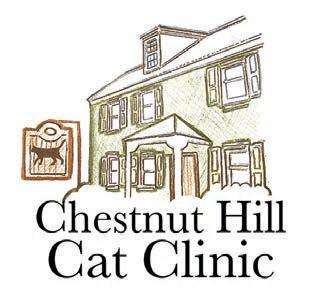

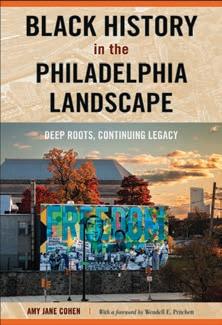


April 2024 THE SHUTTLE 9
MEMBER BENEFIT notary service BY APPOINTMENT Mt. Airy: 215-843-2350 x119 or notary@weaversway.coop Germantown: cpoinvil@weaversway.coop ANOTHER GREAT REASON TO JOIN. 215-247-9560 8220 Germantown Avenue www.chestnuthillcatclinic.com Taking care of cats and their people for over 35 years. Scan to view our EVENTS CALENDAR for updated information on all our authors’ appearances MEET OUR AUTHORS Available at your favorite bookseller tupress.temple.edu
Photo by Brad Maule
Should We Form a Battery Collective? Take Our Survey and Let Us Know
by Coleman Poses, Weavers Way New Economy Incubator Committee
In february 2021, a series of winter storms resulted in a sudden drop in thermometer readings across Texas. Temperatures as low as 5o placed such extreme pressure on the electric grid that 4.5 million homes and businesses were left without power. As a result of the cold and the power failure, over 200 people died. Some of those deaths were attributed to the inability of electronic medical equipment to effectively operate without an adequate source of energy, according to a May 2021 article on National Public Radio’s website.
While such weather events are not everyday occurrences, the severe meteorological shifts that we have been experiencing due to climate change mean that they happen more than in the past. According to the same NPR article, since the onset of the new millennium, power outages have increased tenfold in comparison with the 1980s and ‘90s.
If you’ve lived in the Delaware Valley for any length of time, you can attest to the vulnerabilities of our power grid. As I write this, a PECO map is registering 43 outages affecting 127 customers. And many remember the derecho that swept
through our area in June 2020, causing 850,000 residents of southeastern Pennsylvania to lose power for several days.
For many, such outages constitute a minor annoyance. We may lose telephone and internet communication, or we may miss the entertainment derived from radio and TV. But chances are that such blackouts will not be the life-or-death issue they are for people who depend on electric medical devices. Some energy companies, such as Pacific Gas & Electric, have anticipated this need during power outages, and supply many vulnerable customers with backup batteries. Unfortunately, PECO currently has no such system in place.
To address this deficit, the New Economy Incubator Committee is thinking about forming a battery collective. The collective would be open to anyone, and its purpose would be to provide batteries to members who make a request during a power outage. Priority would be given to the medically needy, followed most likely by individuals who depend on electricity for their livelihood.
This idea is not new. The People Power Battery Collective is a self-gov-


erned organization in the San Francisco Bay area that provides backup power for members who are facing power emergencies. Here’s how the program works:
1. Members store the batteries until there is a need for power in the community.
2. During a power emergency, the person in need of electricity is connected with the person with the batteries, and delivery is arranged.
3. After the emergency has passed, the person who received power will recharge the battery so it’s ready to share with the next person experiencing such an emergency.
The collective has been generous with its materials, and we have used many of them in formulating what such a project might look like in the Philadelphia area.
While the collective’s members will ultimately have the say in developing this program, the first step is to determine the need and interest in our community. We ask that you take roughly 10 to 15 minutes to complete our “Needs and Resources Survey”, which will give us an idea of our next steps. You can find the
survey by focusing your camera on the QR code at the end of this article.
With a little effort, we can use the same cooperative principles that have governed the Co-op for decades and apply them to this effort. By doing so, we can help make our communities more resilient when calamities occur.


10 THE SHUTTLE April 2024 MAY 16 2024 6:00 EVENING THE FRANCIS COPE HOUSE Awbury Arboretum 1 Awbury Road Philadelphia, PA 19138 More info at awbury.org HONORING JudyWicks GARDEN PARTY & BENEFIT A Peachtree Fine Dining Event SAVE THE DATE Germantown Kitchen Garden Farm Stand & Plant Nursery Veggie & Herb Seedlings * Fruiting Trees & Bushes * Native Plants Perennials, Shrubs, & Trees * Local, Organically Grown Produce * Pasture Raised Eggs * Fresh Sourdough Breads Philly Grown Flowers * Farm Stand Opens May 11th, Saturdays 9-1 Plant Nursery Opens April 6th, Saturdays 9-1 & Sundays 10-2 Online Anytime starting March 30th 215 East Penn Street | 610 505 4881 germantownkitchengarden.com
New Economy Incubator Committee
Sale of SEPTA Key Cards Is in the Co-op’s Future
by Betsy Teutsch, for the Shuttle
Chestnut hill, mt airy and germantown are in high gear to prevent the closure of our beloved SEPTA Chestnut Hill West regional rail line. SaveTheTrain.org, headed by West Mount Airy Neighbors, is lobbying hard and Weavers Way has joined the coalition. Our train and bus lines are vital for our community, and we should be expanding rather than eliminating them.
The Chestnut Hill West line is on the chopping block due to a budget crisis and low ridership. Along with heavy duty lobbying for Gov. Shapiro’s recommended influx of money for SEPTA, we need to boost ridership. Our neighborhood is car friendly; switching to public transit has many advantages, but shaping new habits takes work. Many local folks have no idea how to pay SEPTA fares — especially since the Key card system is relatively new — and routes are opaque. We need to change that.
Weavers Way is stepping up to help. One recent Sunday evening, I looked up where to obtain a SEPTA Key, the new reloadable, contactless payment card for all transit lines (trains, bus, subway, trolleys, et al.). Sadly, the answer is nowhere local. Many of the ticket sale offices have been closed. They are also sold at retail stores, but not in our area. This makes it hard to literally get people on board.
I emailed General Manager Jon Roesser and suggested that the Co-op start selling Key cards. He agreed, and less than 15 minutes later reported he had already filled out the paperwork. Retail accounts are handled by a third party, and moving through the bureaucracy is taking time. But Jon is confident we will soon be selling those Keys to the kingdom.
Key cards cost $4.95. If you register your card online, the $4.95 is refunded and added to your balance.
Key users can then link their card to their credit cards and arrange for auto-refill. Cash can also be added at SEPTA station kiosks, though many find that process befuddling.
SEPTA Keys eliminate the former hassles of advance purchase of tickets or requiring exact change. When we drive, we have no idea how much it is costing us per mile; using a Key card similarly shields us from thinking about how much public transit costs. For sure, it’s cheaper than driving and parking! Other benefits include discounts, multiple fares from one card, and the integration of all SEPTA payment structure systems.
Senior Key cards are free for users; they are available through the local offices of state legislators or by making an appointment and heading to the SEPTA office at 1234 Market Street in Center City. Their phone number is 215-580-7145 (Press 6). Note that SEPTA is reimbursed for seniors’ rides; payment chiefly flows from the state lottery.
Here's how to get to each Weavers Way location via SEPTA:
● Chestnut Hill is on the Route 23 bus and is a nineminute walk from the Chestnut HIll West station.
● Mt Airy is a four-minute walk from the Route H Bus stop at McCallum and Carpenter. It is eight minutes from the Carpenter Lane stop on the Chestnut Hill West train.
● Germantown is literally two minutes from the Chelten Avenue stop on the Chestnut Hill West. It is four minutes from the Route 65 and 53 bus stop at Wayne and Chelten avenues.
● Ambler is about a 10-minute walk from the Ambler stop on the Lansdale/Doylestown line. By bus, you can take the 23 to the top of Chestnut Hill and switch to the


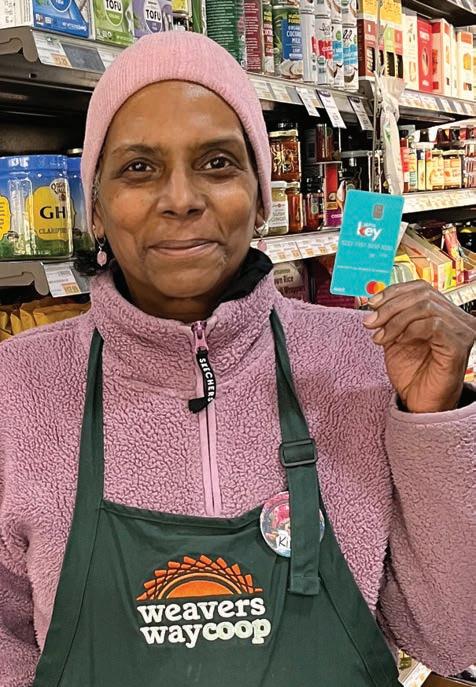
94, which stops right across from the store. Get on SEPTA! Read, listen to music, catch up on podcasts, watch people and scenery, help unclog our roads, reduce your carbon footprint and save our train!
Did You KNOW ?
A Centuries-Long Presence in Mt. Airy
St. Michael’s Lutheran Church 6671 Germantown Ave.
Built: 1896
Architectural Style: Gothic Revival
The st michael’s church currently on the Germantown Avenue site was designed by Philadelphia architect T. Frank Miller and was the third church built there. The first was built in 1730. The church building was expanded in 1746, and a bell tower and pipe organ were added in the 1750s. It was rebuilt in 1819 and again in 1896, according to the cornerstone.
According to the historical records of 1728, the first pastor of St. Michael’s was Anthony Jacob Henckel, who is buried in the church’s cemetery. The Rev. Andrena Ingram, the first African American woman pastor at St. Michael’s, served there from 2006-2016.
After 288 years of active church services, St. Michael’s was closed on Sept. 11, 2016. Bishop Claire Schenot Burkat of the Southeastern Pennsylvania Synod presided at the final service, assisted by the Rev. Dr. Philip D.W. Krey, a former member of the congregation and the retired president of the Lutheran Theological Seminary of Philadelphia. The synod is now responsible for the church and cemetery.

The cemetery, which is large and surrounds the church, includes gravestones that are believed to date back to the 18th century, including four patriots of the Revolutionary War. Several of the names on the headstones reflect the names of German residents of the era. Many of the headstones have weathered over time and are illegible.
St. Michael’s is a contributing building to the Colonial Germantown Historic District, a National Landmark district.
For more information on the West Mt. Airy Neighbors Historic Preservation Initiative, contact wmanhpi@ gmail.com.
—Adrienne Carpenter
April 2024 THE SHUTTLE 11 DISCOVER
penncharter.com A Friends school, pre-K to 12, on 47 acres in East Falls, Philadelphia
YOUR at Penn Charter
Photo by Karen Plourde Chestnut Hill Bakery Buyer Kim Hopson with her trusty SEPTA Key card.
2024 Official Ballot ELECTION FOR WEAVERS WAY CO-OP BOARD OF DIRECTORS
Candidates were asked to provide written answers to the following four questions. Responses were limited to 250 words.
1. Why are you a member of Weavers Way? Please describe your involvement in Weavers Way: shopper (at which of our stores), working member, committee member, special projects and other activities.
2. Describe your experience with overseeing a business or organization’s budget and financial performance.
3 What do you perceive to be the long- and short-term challenges facing Weavers Way?
4. What volunteer or professional experiences have you had with other cooperatives or organizations that will help you strengthen the Weavers Way Board?
Ellen Badger
1. I’m a Weavers Way and you-pick CSA member and buy nearly all my groceries at the Co-op. I appreciate the Co-op’s Ends and ambition, especially its contributions to the local economy, environmental stewardship, fostering of a diverse, inclusive, and friendly community, care for employees and ethical sourcing. I also love going to the Co-op to pick up products that inspire my creative side and love of cooking.

2. I started my career in anti-poverty nonprofits. I got my introduction to budgeting and financial management at the Wharton School, where I sought a Master’s in business administration to better understand how to help social impact organizations thrive. Since then, I have seen the practical application of my studies as a consultant who advises governments, businesses, nonprofits and foundations on strategy, operations and organization.
3. Short term: Successfully launching the Germantown store (and learning and adapting), while maintaining quality, profitability and growth at other locations.
Long term: Advancing the Ends while competing in a difficult industry. Sometimes, these will feel like they are in tension; however, an unwavering commitment to the Ends is essential.
4. My work has prepared me to understand the special circumstances of a missiondriven organization and the practical realities of running a sustainable business. I bring experience with decision making and strategy and with helping teams come to consensus in the face of uncertainty. I also bring board experience with the Chestnut Hill Local and the Lenfest Institute for Journalism.
Bill Coleman
1. I shop at Chestnut Hill daily, Mt. Airy and Ambler occasionally. I’ve been a Co-op member for over 40 years and a working member for 10 years. No special projects.
2. I created a home delivery business, using an old Post Office truck. Other experience includes selling wholesale produce, running three different corner stores, operating a food brokerage and running a nine-store farmers market in West Philadelphia. At Firehouse Farmers Market, I served as manager, leasing agent, business broker and retailer. I was never a “suit,” but always an entrepreneur. I consistently matched income with expenses (which is difficult with startups). I always succeeded in selling the businesses I created. Early on, I was advised by Jules Timmerman.

3. Short term: Get Germantown open and stable. All stores, led by Germantown and working with suppliers, can offer more special prices. Long term challenge: How many satisfying lifetime careers can the Co-op support?
4. Firehouse Farmers Market: partnered with Cedar Park Neighbors for 10 years. Created and ran Friday Night Jazz at the Firehouse for seven years, highlighting local talent. Played a significant role in transforming Baltimore Avenue corridor and Cedar Park Neighbors Community Association. Estate of H. C. Coleman: board member 50 years; chairman, 20 years. Supported many micro projects. I have experience in creating and supporting new ventures while working with a community organization.
TO VOTE ONLINE
April 1 - May 13
Online voting will end at 4:15 p.m., Saturday, May 13 Log into members.weaversway.coop and select “Weavers Way Elections” under My Co-op.
Or wait for your email with a custom link so no login is needed. or see next page if you prefer a paper ballot.
Cheryl Croxton
1. I believe in the Co-op’s commitment to excellent food options and its status as an anchor for stable communities. My family joined Weavers Way over 24 years ago. We shop there regularly and enjoy its produce, local dairy and prepared foods. I am currently president of the board and was previously vice president. I worked on the new Strategic Plan and the development of the Germantown store. I also serve on the board of Weavers Way Community Fund.
2. I have financial services, executive and legal experience in mortgage servicing, crisis management and affordable housing financing. Much of that was with Fannie Mae, a company that supports the nation’s housing finance system. I also served as corporate counsel and advised business partners.

3. Weavers Way serves communities with numerous grocery options; this highly competitive environment challenges loyalty. We must continue to ensure the Co-op’s financial and operational strength while encouraging deeper connections to the people it serves. I’m interested in helping connect board members with the Co-op’s community of multi-neighborhood members, employees, vendors, community partners and others to listen, share and guide the mission.
4. I am a collaborative leader who enjoys working with others to solve big, hairy problems. In addition to my experience as a mortgage finance professional and lawyer, I’ve served on business & community advisory boards. Early on, I worked in marketing at Procter & Gamble and I was a Future Farmer of America at Saul High School.
Jason Henschen
1. I moved to the area ‘for the girl’ in 2006. Soon after, I became a Co-op member through my household and looked for ways to become more involved. From 2008 to 2011, I was a member of the Environment Committee. In 2021, I joined the board and last year took on the role of secretary. I am currently the chair of the ad hoc equity committee and a member of both the Germantown Outreach and steering committees.
2. As sales director for High Point’s wholesale division, I was responsible for the largest revenue source for the organization. As a board member, my current fiduciary responsibilities include reviewing and monitoring budgets and analyzing potential business opportunities for the Co-op.

3. Recently, I have been most involved with preparing for the opening of the Germantown store. Once that happens, Weavers Way’s immediate challenge will be to ensure the store’s financial success as a new business in a richly diverse neighborhood with a range of incomes. Rival stores will continue to find ways to deliver their products faster and more efficiently, so over the long term we will need to keep pace with this rapidly evolving market.
4. My experience on the board over the past three years has allowed me to build strong relationships with fellow board members and local community organizations. I look forward to the opportunity to continue this work and to grow these relationships for another term.
For their video statements, candidates were asked:
1. Why do you want to be on the Weavers Way Board?
2. What skills, knowledge, and experience do you have that would be an asset to the Board?
3. What could Weavers Way look like in five years?
4. Is there anything you want to say about yourself that would help members vote?
To view the candidates’ video statements, visit www. weaversway.coop/VOTE-2024
12 THE SHUTTLE April 2024
Gail McFadden-Roberts
1. I shop twice a week at the Co-op and my youngest son buys a meal from the prepared foods department or deli 2-3 times a week. I’ve served on the Leadership Committee and co-chaired the General Membership Meeting. I am a current board member, serve as treasurer and chair the finance and audit committees.
2. I am a trustee at my church. A key responsibility is financial oversight — monitoring sufficiency of income to cover expenses and maintain ministries. My financial oversight experience includes devising strategies and solutions for financial challenges that may arise. I chair the investment committee of the Ivy Legacy Foundation and the finance committee of the Pennsylvania Association of Parliamentarians.

3. I perceive two challenges for the Co-op: increasing our working member numbers and making sure we get the expansion in Germantown right for current members, new members, non-member shoppers and our new Germantown neighbors. All gas and no brakes on our current community outreach in Germantown is my recommendation for getting the Germantown expansion right for everyone. It should be a long-term effort that continues well past the startup years. Working membership used to be baked into our culture and that culture was our market edge. Continuously showing members how we are a key contributor to our competitive advantage is what I believe will increase our working cooperator numbers.
4. My volunteer and professional experiences include human resources and labor relations (I supervised staff that were union members); strategic planning, financial management, employee engagement and organizational development.
Dan Packel
1. We’ve purchased most of our family’s groceries at Weavers Way Mt. Airy for the eight years that we’ve lived in the neighborhood, and I occasionally shop at Chestnut Hill and Ambler. I’ve been a working member for just as long.
2. In my current professional role as an editor for a series of legal news publications, I’ve worked to plot out travel and expense budgets for the reporters on our team. I look forward to better understanding the budgeting process at Weavers Way.

3. The recent closure of Kensington Community Food Co-op illustrates the challenges for cooperative groceries that don’t have their act together. Luckily, Weavers Way has over 50 years of experience in the market and good will in the community to trade upon. But in the face of growing pressure from discount grocers and gourmet purveyors operated by tech giants, that alone is not enough. In the short term, the Co-op must ensure the successful opening of the new Germantown store, including the right product mix and pricing to thrive in the neighborhood. Keeping prices competitive while maintaining a commitment to Weavers Way’s values is a longterm challenge, given the likely limits to further expansion. The Co-op can only embrace economies of scale so far.
4. My family belongs to the Mt. Airy Babysitting Co-op, which is almost as old as Weavers Way. And I have worked in specialty food retail, which gives me insights into product mix and the retail experience.
Francena Turner
1. I have been a shopper at Weavers Way since the ‘90s and am now a working member. As a young mom, I found the Co-op to be a reliable source of healthy, fresh food that nourished my family and supplemented my vegetable garden. Currently, I'm more grounded in promoting local or regional sources of food, urban farming practices and business models that create more equitable access to high quality products for our community.
2. I've served in leadership positions (president, executive vice president) for over 20 years in housing, finance and development. I supervised operations and multimillion-dollar development budgets. Risk and feasibility analysis, design and construction required a high level of competency with working through professional teams and communicating with community interests. Financing collaborations supported the required layers of capital grants, loans and equity investments.

3. I'd like to understand how the Co-op’s organizational structure evolved. I’m also concerned about the increasing complexity of business risks and the need to maintain critical competencies. How can we ensure that our leadership has the capacity to keep up with our business portfolio? What measurements are used to objectify performance? Is there a plan to backfill critical positions if they are vacated?
4. My career was based in the nonprofit and public sectors, which are attuned to community interests and collaborative decision making. I believe my experience in strategic planning, feasibility analysis, finance, real estate development and program assessment will be especially relevant to Weavers Way.
TO VOTE with Paper Ballot
Place ballots in the ballot box at the Ambler store, 217 E. Butler Ave., the Chestnut Hill store, 8424 Germantown Ave., or the Mt. Airy store, 559 Carpenter Lane, by 8 p.m. Friday, May 12, 2024.
2024 OFFICIAL BALLOT Election for Weavers Way Co-op Board of Directors
Voting in the stores will end at 8 p.m.
Friday, May 17, 2024.
To vote online: See the instructions in the Online Member Center at members.weaversway.coop (login required) or follow the directions in your election reminder email. Note that the order of the candidates in the online ballot is randomized, rather than alphabetical, as in the paper ballot. Online voting will end at 5:15 p.m., Saturday, May 18.
To vote by mail: Ballots will be accepted by mail if received by Thursday, May 16 at the Leadership Committee mailbox. Mail to: Leadership Committee, Weavers Way Co-op, 559 Carpenter Lane, Philadelphia, PA 19119.
To vote in stores: Place ballots in the ballot box at the Ambler store, 217 E. Butler Ave.; the Chestnut Hill store, 8424 Germantown Ave.; the Mt. Airy store, 559 Carpenter Lane, and, if open, the Germantown store, 328 W. Chelten Ave. Paper ballot voting will end at 8 p.m., Friday, May 17.
AT-LARGE DIRECTORS
Vote for no more than four (4), including any write-in candidate you propose. All winners will be announced in an email to all members and at the end of the General Membership Meeting on Saturday, May 18.
Please note: One ballot per member household. Once a ballot has been cast, it cannot be changed.
❏ Ellen Badger
❏ Bill Coleman
❏ Cheryl Croxton
❏ Jason Henschen
❏ Gail McFadden Roberts
❏ Dan Packel
❏ Francena Turner
Write In
Write In
Write In
Fold in half for a confidential vote. Every effort will be made to maintain the privacy of each member’s ballot. One ballot per member household; the first registered ballot will be the one that counts. Any paper ballots received after an online ballot is cast (by the same household) will not count.
Date ____________________ Member # ________________
Print name_______________________________________ Signature _______________________________________
Spring
General Membership Meeting 2024
Saturday, May 18, 5-6:30 p.m.
Awbury Arboretum
1 Awbury Rd, Philadelphia, PA 19138
RSVP www.weaversway.coop/GMM
Board election results will be announced at the meeting. Voting ends at 5:15 p.m.
April 2024 THE SHUTTLE 13
$
A Meadow Will Soon Spring Up at Deal Memorial Park
by Erin Landis, Water Programs Manager, Wissahickon Trails
Deal memorial park is made up of 1.9 acres of open space that runs alongside the Sandy Run in Abington. The land was acquired by Abington Township in 1998 under tragic circumstances. A sudden deluge of rain in 1996 caused the run to rise quickly; some reports stated that it rained over eight inches in two hours.
The intense thunderstorm flooded 200 homes and caused $1 million in damages to Roslyn Elementary School. But the biggest loss by far was of Francis and Marie Deal, who died after their home was flooded.
Multiple houses, including the Deals’, were purchased by Abington Township through the Federal Emergency Management Agency’s Hazard Mitigation Grant Program in 1998. This program funds the purchase of homes, which are then demolished, and the land remains open space in perpetuity, preventing future loss of life and infrastructure from further flooding. Since 1998, Deal Memorial Park has been open space and is maintained as a lawn area, with a few large shade trees.
But the park will soon be home to a native meadow, thanks to the Pennsylvania Environmental Council, Abington Township and the ecological restoration company ArcheWild. Within a few years, the park should support attractive native grasses and flowers, which will require minimal long-term maintenance and provide many benefits. A walking path will be regularly mowed so that people can use the park and enjoy the meadow.
The installation project is being fully paid for through a grant that PEC received from the National Fish and Wildlife Foundation. Once the meadow is installed later this year, Abington Township will take on establishment of and maintenance responsibilities for it.
The meadow conversion has many benefits, but given the history of the park, perhaps the most critical is addressing the issue of flooding. Stormwater (which runs off our roofs, roads and lawns during storms), is the main cause of flooding. Mowed grass does not absorb much water during rainfall because turf grass roots are only a few inches deep, which does not allow for much water



absorption. Regularly used heavy mowing equipment further compacts the soil, which prevents water from soaking into the ground and creates more runoff.
The meadow will be full of plants that are deeprooted and absorb lots of water. These roots loosen soil and create pathways which allow water to better soak into the ground. Soils that are less compacted due to reduced mowing also can absorb more water.
This lawn to meadow conversion will greatly enhance the land’s capacity to absorb stormwater and will take a small step toward reducing downstream flooding during future storms. Abington Township and partners like Wissahickon Trails are collaborating on other stormwater management practices along Sandy Run that seek


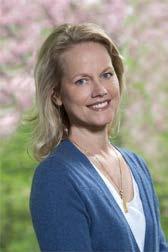



to further inhibit rainwater runoff and reduce flooding and stream bank erosion.
But those are not the only benefits. The meadow will feature plants that are indigenous to this area and have evolved to thrive in our region’s climate. ArcheWild is carefully selecting specific plant species that will do well at this location. While the plant root systems will provide much better stormwater management, the plants and meadow will also offer habitat for birds and butterflies and support wildlife. In addition, the meadow will require less maintenance and will have a reduced mowing schedule that will save the township time and money.
Throughout this spring, ArcheWild will prepare and install the meadow at the park, including suppressing the turf grass and other non-desirable vegetation prior to sowing native seeds. Although the mature meadow can take a few years to establish, the park will exhibit signs of germination this summer and will continue to improve aesthetically and functionally every year. Other than dead grass, erosion control fencing and exposed soil with a covering of straw, Deal Memorial Park will look largely unchanged during the initial establishment.
While in the long term, the meadow should require minimal maintenance, ArcheWild and Abington Township will work to care for the meadow this summer to help ensure success. We are excited to support this installation and see how it grows and evolves over the next few years.
Projects like this and others that manage stormwater aim to reduce the risk of future storms and flooding and the subsequent loss of life, infrastructure and property. We would love to hear from neighbors and the Roslyn community about the meadow project. Please reach out to pracette@pecpa.org, the project manager, or Abington Township at publicinfo@abingtonpa.gov to share your thoughts!


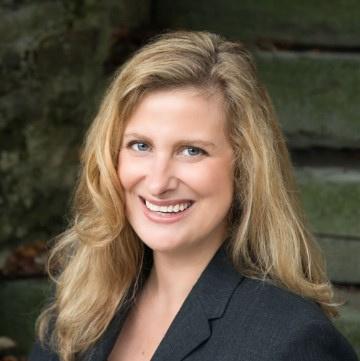

14 THE SHUTTLE April 2024 VISIT OUR WEBSITE BAIYINA BROWN (215) 718-9439 BILL SHELTON (267) 625-7938 JENNIFER FLYNN (215) 292-5116 ERNIE TRACY PAULA SEITCHIK (215) 740-2921 REBECCA BUFFUM (415) 608-5479 CAROLINE MASTERS (215) 206-7629 Explore listings, find your current home value, learn about the team and more! 8400 Germantown Avenue Suite 2 | Philadelphia, PA 19118 Office (215) 247-3750 The Living Well Homes Collective is a dynamic group of awardwinning real estate professionals who have an established track record of providing clients with reliable, honest and caring service. Expert. Strategic. Collaborative. A member of the franchise system of BHH Affiliates, LLC. livingwellhomescollective@foxroach.com Interior/Exterior Painting 35 Years of Professional Experience Locally owned and operated Schedule your free estimate Visit us online: planetpaintsolutions.com 215.948.3747 Lead Paint Certified Contractor. Hansell Contractors, Inc. Builders - Historical Restoration - Fine Carpentry Energy Conservation - Architectural Design Services HansellContractors.com Office: 215-277-1540 Fax: 215-277-1390 Lic.# PA022176 EPA Lead Certified
Photo by Erin Landis
What You Can Do at Home to Mitigate Stormwater Runoff
by Andrew Bunting, for the Shuttle
As weather patterns continue to change and there are more instances of flooding and inundation from significant rainfall, it will become more necessary to develop home landscape infrastructure to help capture and mitigate stormwater runoff and rainfall. Fortunately, there are many ways to do this. Here are a few:
Save the Water
Stormwater can be captured from the gutter systems of houses by using water tanks and rain barrels in various sizes. The water they capture can then be used as needed for plants in the garden. Ideally, every downspout on the house could be retrofitted with a rain barrel.
Plant Trees
One of the easiest solutions for dealing with stormwater runoff is to plant large shade trees and street trees with aggressive root systems that will absorb large amounts of water, including the London plane tree. Exclamation!™ is a variety from the Morton Arboretum and the Chicagoland Grows Program which has an upright pyramidal habit. It is an exceptional selection recognized by the Pennsylvania Horticultural Society’s Gold Medal plant program. It makes an excellent street tree and can survive both dry and wet conditions.
Many varieties of the red maple are also excellent for absorbing water during periods of inundation. Some of these include October Glory®, Red Sentinel™ and Red Sunset®. As the name implies, red maples are notorious for their exceptional red fall color. This native maple is one of the best street trees, because it adapts to a host of urban conditions, including drought. It’s also able to grow in poorly drained areas.
The Black tupelo is another fantastic native tree that should be planted to mitigate the impacts of stormwater. Outstanding Black tupelo varieties include Firestarter® (with an upright pyramidal habit), and Green Gable™, which has a more rounded canopy. Red Rage® and ‘Wildfire’ feature an exceptional fire engine red fall color.
Installing a Rain Garden
There are many types of rain gardens that would work in a home setting. Typically, soil is excavated from the garden, creating a depressed area below the existing property grade. The surrounding soil can be graded so that when it rains, the stormwater runoff is directed toward this depressed portion of the landscape. If the area is large and reasonably deep, it can capture large amounts of precipitation during a rain event. The area will fill up with water and over time, the accumulated water will percolate into the surrounding soil, reducing stormwater runoff.
For a rain garden to be successful, it should be plant-
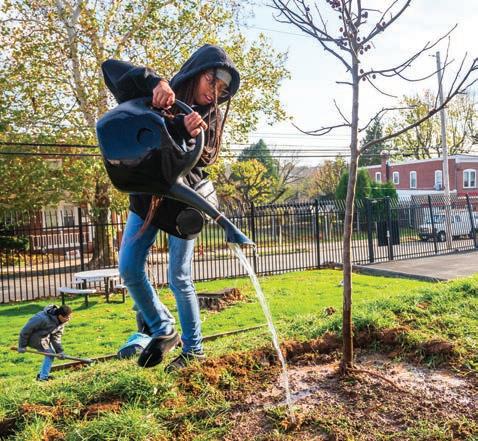
ed with shrubs and perennials that can withstand being submerged for extended periods of time and can help to absorb excess moisture. Some great choices of perennials for rain gardens include several sedges, including Carex amphibola, C. comosa, C. emoryi, C. stricta and C. volpinoidea. Many ferns can handle periods when they are wet, including the lady fern (Dryopteris marginalis); Athyrium (Filix-femina); marginal wood fern; ostrich fern; Matteuccia struthiopteris; sensitive fern (Onoclea sensibilis); cinnamon fern (Osmunda cinnamomea) and the royal fern (Osmunda regalis var. spectabilis).
One of the most beautiful of all the rain garden perennials are the Joe-pye weeds. These robust and stout plants are characterized by many dome-shaped purple flowers in the late season. Eupatorium purpureum ‘Gateway’ can reach five to seven feet tall, while the new ‘Little Joe’ is much more diminutive.
The cardinal flower (Lobelia cardinalis) has bright, vibrant red flowers that are a magnet for the Ruby-throated hummingbird. Other great flowering plants include the pink flowered turtle flower (Chelone lyonia); ‘Hot Lips;’(Hibiscus coccineus), which reaches eight feet tall with stunning late summer red flowers, and the white, candelabra-like flowers of the culver’s root, (Veronicastrum virginicum), which makes a great architectural statement.
A rain garden’s habitat can be further developed by adding shrubs, and there are several shrublike hollies that make a great statement. In the wild, the winterberry (Ilex verticillate) grows on the edge of ponds and lakes, making it a perfect plant for wet areas in the garden. This multi-stemmed shrub is covered in ornamental berries from September to March. ‘Winter red’ has an abundance of bright red fruits, while ‘Winter gold’ has an equal abundance of salmon-orange fruits. ‘Maryland

beauty’ is a heavy-fruiting selection. For good fruit, you should also include a male pollinator such as ‘Southern Gentleman.’
The inkberry holly, (Ilex glabra) is a small to medium-sized evergreen shrub that thrives in wet soils. The narrow, shiny, evergreen leaves are great in combination with other plants with ornamental winter stems and winter berries. ‘Shamrock’ is a more diminutive selection and Ilex glabra Strongox® is a new variety that is being promoted as a boxwood substitute.
The native buttonbush (Cephalanthus occidentalis) is another great shrub to consider; at maturity, it can reach up to 10 feet tall. In mid-summer, it’s covered with an abundance of orblike white flowers. Many native butterflies, including swallowtails, are attracted to buttonbush flowers.
Many red-stemmed dogwoods are also excellent for winter interest and can thrive in rain garden conditions. One of the best is Cornus sericea ‘Cardinal’, which has stems that reach up to seven feet tall. In the winter, the stems turn a brilliant pinkish orange. The stems are often best offset with an evergreen backdrop, such as the inkberry holly or the white cedar (Chamaecyparis thyoides).
In addition to being a great landscape feature that captures water and mitigates stormwater, the rain garden adds considerable beauty to the garden and landscape. It also plays a significant role in filtering out pollutants from runoff from the garden.
Andrew Bunting is Vice President of Horticulture for the Pennsylvania Horticultural Society.


April 2024 THE SHUTTLE 15
Join us for counseling and community programs to laugh, connect, and grow! Flourtown Commons 1811 Bethlehem Pike Suite 212-213 (215) 233-2002 FIND US ONLINE www.TheResiliencyCenter.com TheResiliencyCenter resiliencygatherings FIND US IN FLOURTOWN
Revolting Against the Arab World’s Power Structure

This month in the shuttle, the Co-op’s Racial Diversity, Equity and Inclusion Advisory Committee focuses on an important part of Arab history in recognition of Arab American Heritage Month.
The 2010 Arab Spring was a succession of anti-government demonstrations that protested entrenched monarchial and totalitarian regimes and extreme poverty and political corruption in North Africa and the Persian Gulf countries. Uprisings took place in Algeria, Bahrain, Dijbouti, Egypt, Iraq, Jordan, Kuwait, Lebanon, Libya, Mauritania, Morocco, Omar, Palestine, Saudi Arabia, Sudan, Syria, Tunisia, United Arab Emirates and Yemen. Over 61,000 people died, many as a result of violent responses by the governments to the protests.
The demonstrations, fueled by social media, began on Dec. 17, 2010, when the

merchandise of Mohamed Bouazizi, a 26-year-old Tunisian street vendor, was confiscated by corrupt officials. His effort to file a complaint was met by a slap in the face from a female officer. After being publicly humiliated, Bouazizi set himself on fire. He is considered the martyr of the Arab Spring and the “symbol of eternity,” according to filmmaker Mohamed Zran.
—Rosa Lewis
Racial Diversity, Equity, and Inclusion
Membership Cards Are Coming This Month!
email a link to every active adult member of Weavers Way. Members will be able to open the link on their smartphones and save a version of their member card to the wallet app on their phone. They will also be able to access that link by logging into the online Member Center on their phones.
Once these cards have been widely distributed and received, we’ll ask members to begin using their wallet card, key fob or phone to scan at checkout. We now have scanners installed at all registers for you to “zap” your physical or digital cards. You’ll want to make sure that every member of your household has access to one of those options, including teens and children who shop without you.
We’re asking members for their member cards to improve, simplify and standardize the checkout process while alleviating burdens on cashiers and administrative staff.
Here is a quick overview of why asking everyone for membership IDs at checkout is going to lead to many positive outcomes:
• Scanning member cards ensures an accurate checkout and saves administrative labor.
Operator error and miscommunications regularly lead to mistakes with keying in the wrong member number. This can be frustrating and even unsettling to members when they receive email receipts for purchases that they didn’t make, especially when it can possibly put their EasyPay funds at risk. This can result in missed discounts, and it increases labor for Membership and IT, because they then have to spend time addressing members’
WEAVERS WAY EVENTS
Third Annual Seed Swap and Bonus Seed Starting Workshop
Saturday, Apr. 6 Noon - 3 p.m.
326B W. Chelten Ave.
Germantown
Spring is here, and the time has come for our third annual seed swap. Join us to share seeds, gardening stories, bulbs and seedlings. Please provide as much information about your seeds as possible, including variety, in what year the seeds were packaged, and growing tips. We will have some envelopes and other seedkeeping supplies to help you organize what you take home. This year we will also host a bonus workshop, during which attendees will learn best practices for starting seeds. We are cohosting this event with the Philadelphia City Repair Project. Check out their website for more information: www.phillycityrepair.wordpress.com
Weavers Way Hosts: Building a Cooperative Economy with Equal Exchange
Thursday, Apr. 11 5:30-6:30 p.m.
The Café at Weavers Way Ambler
Join Equal Exchange for an evening of exploring their work with small farmers and one of the critical but lesser-known aspects of their alternative business model: the role of capital. The Co-op and EE have a longstanding partnership that helps to foster a cooperative and democratic economy for small farmers worldwide. Learn how they do business and how you can make a meaningful impact on the food system. There will also be ample offerings of their fairly traded treats, including chocolate! RSVP to Frankie: fpondolph@equalexchange.coop.
Weavers Way Hosts: Building a Cooperative Economy with Equal Exchange — A Virtual Session
Monday, Apr. 15 Noon-1 p.m.
See description for April 11. Register for Zoom: https://tinyurl.com/5n9xe9wr
Recognizing Medicare Fraud, Abuse and Other Scams
Wednesday, Apr. 17 10:30 a.m.- noon
Virtual Session via Zoom
(Continued from Page 1)
concerns, researching errors and correcting them.
• Scanning member cards ensures a secure checkout.
When it comes to EasyPay — members’ personal “house accounts” that store funds to be used at the register – there is no room for error. Typing in the wrong member number introduces an unnecessary risk to members. Presenting your member card when using EasyPay safeguards your funds.
• Scanning member cards ensures an equitable, standard checkout experience for everyone.
Membership-based organizations ask for identification. We have all experienced having to show a card at a gym or at a buying club. Since the Co-op has never had this requirement, some members have expressed concerns with being asked for identification when others are not.
For newer, less frequent shoppers and members of color, who may rightfully ask “Why was I required to show ID and the person before me was not?”, a standard checkout process that relies on scanned membership IDs helps alleviate this problem. We want every member to feel as if they are receiving the same welcoming treatment at checkout, no matter who they are or how long they have been with us.
Beginning later this month, look for your new member cards, check out the email with your downloadable digital card, and practice bringing either your physical or digital card to the Co-op when you shop. Scan it every time! Doing so will ensure an accurate, secure and equitable checkout process for everyone.
Every year, Medicare is defrauded of billions of dollars. This webinar will alert you to how scammers try to get your Medicare number to commit fraud, and how this affects our premiums, out-of-pocket costs and quality of care. Joan Adler, a certified APPRISE counselor with five years of experience, will provide information on protecting yourself from Medicare scams and fraud. We will also discuss how to recognize other scams. Please email outreach@weaversway.coop to register. You will be emailed a Zoom link after you register.
Help Weavers Way Germantown Go Solar: In-Person Information Session
Wednesday, Apr. 17
520 Carpenter Lane
Mt. Airy
7-8 p.m.
Weavers Way has partnered with the Clean Energy Co-op to put solar panels on the roof of the new Germantown store. You can help by joining the Clean Energy Co-op, which utilizes a collective investment model to enable its projects to proceed. This session will take place in the Oceania conference room located in the Mt. Airy Axis coworking space. Please register at weaversway.coop/events.
New Member Orientation
Wednesday, Apr. 27 5:30-6:30 p.m.
6757 Greene St.
Summit Church, Enter on the Greene St side
We encourage all members to attend a New Member Orientation after joining. These informal gatherings cover the Co-op's history, explain its current operations and clarify the importance of your membership. We'll explore our Online Member Center, discuss the benefits that come with membership and help you choose if working membership is right for you. You'll have the opportunity to meet other members and Co-op staffers while enjoying light refreshments and learning how to make the most of your Co-op membership! Plus, all members will earn two hours of work credit just for attending. What a great way to jump start your working membership!
Membership Office and Notary Hours
Mt Airy: 555 Carpenter Lane
Membership and Notary Services
Monday - Friday 11 a.m. - 5 p.m.
EVENTS ARE FREE
16 THE SHUTTLE April 2024
more info: www.weaversway.coop/events
For
The original uploader was HonorTheKing at English Wikipedia. Left: Tahrir Square - February 9, 2011.
Right: Tunisia Unrest - VOA - Tunis 14 Jan 2011
We Need to Advocate for a Better, Fairer Farm Bill
by Sandra Folzer, Weavers Way Environment Committee
Ididn’t know much about the Farm Bill that was signed into law last November, but I assumed it gave help to small farmers. I was wrong.
I didn’t realize 60% of farmland in the United States is used for commodity crops, like corn and soybeans, according to a 2013 article published by the Union of Concerned Scientists. These crops are subsidized by the U.S. Department of Agriculture. We grow them to fatten animals on factory farms and for processed food.
Since 1985, the USDA has offered farmers money to adopt conservation practices such as growing soil-stabilizing crops like rye and oats for rotation and planting grasses or legumes to trap chemical runoff. That sounds balanced, but it’s not. Most of the money — $14 billion a year between 1995-2021 — is spent on commodity crops and around $5 billion on conservation, according to the USDA’s Economic Research Service. This has been going on for decades, thanks to lobbying and campaign donations from agribusiness.
The first Farm Bill was passed 90 years ago under President Roosevelt’s New Deal so farmers could make a living. The present extension of the 2018 Farm Bill allows authorization until a new bill is created. As Food and Water Watch pointed out in a report last January, “A fair Farm Bill would let the people who grow our food earn a decent living, practice environmental stewardship, and rebuild the infrastructure that consumers need to access sustainably grown, regionally produced food.”
The Farm Bill is now up for renewal, as it is every five years. Important issues like climate change and racial equity need to be addressed. While small farmers are barely hanging on, industrial farmers are making millions. Unfortunately, some in Congress want to guarantee prices for soy and corn, which supports the wealthiest farmers. In 2022, receipts from corn and soybean crops totaled $148.5 billion — 53.4% of all crop cash receipts that year, again according to the USDA’s Economic Research Service.
In addition, some politicians want to cut popular programs, like the Sup-
plemental Nutrition Assistance Program, which benefit all farmers and others, to pay for subsidies. Eighty percent of the Farm Bill goes toward nutrition programs like SNAP, according to a February report from the U.S. Senate Committee on Agriculture, Nutrition and Forestry.
A climate-smart Farm Bill should benefit emission reduction and other sustainable practices. It should also help beginner farmers and those who are underserved, such as Black farmers who were basically excluded from USDA programs in the 1930s. Unfortunately, the discrimination continues: The USDA, as part of the American Rescue Plan Act in 2022, granted loans to only 36% of black farmers but 72% of white farmers, according to the Legal Defense Fund.
The Environmental Defense Fund suggests several priorities for a new Farm Bill. They want the bill to encourage farmers to reduce methane emissions from livestock and nitrous oxide from excess fertilizers. They believe crop insurance and diversification of crops are key to helping farmers during times of climate change. Finally, the EDF suggests research to pursue investments, like methane reducing products, to benefit the environment.
Congress mandates a quarterly report for the National Climate Assessment on the impact of climate change. While the report is over 1,000 pages, the key points are as follows:
● As floods and droughts become more common, food productivity and distribution will be affected.
● A quarter of methane emissions in the United States are caused by livestock production. (Methane has about 30 times the warming potential as carbon dioxide.)
● We need to transition from a monoculture to using a mix of crops to avoid synthetic pesticides and fertilizers. We need to build healthier soils to retain more moisture and nutrients.
● We need to reduce food waste. Between 30 and 40% of food is wasted, and much of it is thrown in landfills, which are a major source of emissions.
● We need to invest more in rural communities, where most of the land is cultivated.
● We need to retire more land to improve soil health and biodiversity. However, some in Congress prefer to continue supporting monoculture farming, which benefits large commercial farms.
● We need the Agriculture Resilience Act to invest in research to improve soil and reduce emissions. Other important bills are the Opportunities for Organic Act and Protect America’s Children from Toxic Pesticides Act.
● We should address discrimination within the USDA by providing land grants to new generations of Black farmers. The Increasing Land Access, Security and Opportunities Act would restore the land base Blacks lost due to unfair practices that only gave loans to white farmers. The Fair Credit for Farmers Act would improve access for farm loans by waiving loan fees and payment deferrals.
Other topics being discussed for inclusion in the next Farm Bill are supporting regenerative agriculture and rural internet. Farmers would need to show their plans to preserve topsoil, control runoff and cut greenhouse emissions. There is a precedent in the 1985 farm bill which demanded a plan to retain topsoil. While that requirement remains, enforcement is lacking. One third of the topsoil in the Corn Belt has washed away since the beginning of European colonization in the 1600s, according to a January 2022 article from Civil Eats.
The two government bodies responsible for drafting the Farm Bill are the Senate Committee on Agriculture, Nutrition, and Forestry and the House Agriculture Committee. After the committees make recommendations, the separate chambers debate and make amendments for a compromise bill, which is then voted on and signed by the president. If you want to advocate for sustainability, I suggest contacting the Senate Chairperson, Michigan Democrat Debbie Stabenow, at 202-224 4822.
The Farm Bill extension is projected to cost $428 billion over the next
A Couple of Pointers for a Sustainable Spring
by Marsha Low, Weavers Way Environment Committee
• If your home is air conditioned and you want to save energy during the warmer months, open your windows in the morning as early as possible and leave them open as long as you feel comfortable. Then close them and your shades or curtains to keep your home cooler as the heat builds. If it cools down sufficiently in the evening, open your windows again. If you can install fans in most rooms, they will keep the air circulating and help you feel cooler.
• Attention gardeners: At this point, temperatures are likely to be consistently above 50 degrees during the day and pollinators overwintering under leaves and in hollow flower stems have likely emerged. So you can go ahead and deadhead flowers and plants and prepare your soil for planting. It’s best to sow plants that are indigenous to your area to preserve biodiversity and raise stronger, more resilient plants. Natives are usually easier to care for, require less water and provide essential food sources and habitats for local pollinators and birds.
five years. After the bill is passed, the USDA writes the rules on how these programs will be implemented. This is when the public needs to be vigilant to ensure the rules correspond to sustainable agriculture.
A group of senators, including Amy Klobuchar of Minnesota, is supporting the Farm to Fly Act to produce sustainable aviation fuel. It sounds like greenwashing to me. The goal is to find a new market for biofuels as electric cars overtake gasoline models that use ethanol, which is basically made from corn. It would continue monoculture agriculture, takes much fuel and water to produce, and is less effective than the fuel it replaces. The Inflation Reduction Act gives tax credits to producers of SAF.
Agriculture generates one third of greenhouse gases, so the Farm Bill offers an opportunity to affect climate change. We could reduce the use of pesticides and fertilizers and agriculture's use of fossil fuels. Most importantly, we need to end corporate monopoly over our land and water. Environment Committee
2024 Committee Grants Fund Plants, Supplies for Nonprofits
by Sandra Folzer, Weavers Way Environment Committee
Thanks to the community’s generosity at the Environment Committee’s annual electronics recycling event, we were able to give grants to 15 community groups this year. Grants were awarded to:
● Black and Planted for landscaping supplies and seeds
● Center in the Park in Germantown to continue their water testing project
● A community group in Chestnut Hill, which will use its funds to replace invasive species with native trees at the Chestnut Hill West regional rail station.
● DePaul USA in East Germantown for garden supplies at their homeless shelter
● Envision Success for garden supplies at their transitional housing for youth
● Friends of Hope Lodge in Fort Washington for their planter gardens
● Hillside/Turtle Park in Manayunk for native plants
● Historic Rittenhouse Town in Germantown for native trees and shrubs
● Land Health Institute in West Philadelphia to help create their city park
● Lingelbach School in Germantown for their maple syrup project
● Roxborough/Manayunk Conservancy for soil to plant native trees
● The Schuylkill Center for Environmental Education in Upper Roxborough for composting supplies for a children’s education project
● Water Tower Park in Chestnut Hill for plants and their after-school education program
● Whosoever Gospel Mission in Germantown for flower containers at their homeless shelter
● The Wissahickon School District in Ambler for plants
Thank you. These grants might not be possible without your contributions.

April 2024 THE SHUTTLE 17
Photo by Karen Plourde
The slope garden at Henry H. Houston School in Mt. Airy, prespring edition. Perennials at the garden were funded by a 2023 Environment Committee grant.

Greetings and thanks for writing. Email suggestions to suggestions4norman@weaversway.coop. As usual, suggestions and responses may have been edited for brevity, clarity, and/ or comedy. In addition, no idea, concept, issue, remark, phrase, description of event, word, or word string should be taken seriously. This also applies to the previous sentence.
Last month, I wrote about how some companies view promotional pricing as an opportunity to increase sales using psychological manipulation methods. Recently, I read about another form of promotion — one based on food attributes and the benefits of consumption.
Eden Foods, one of the early health food/macrobiotic store brands, has always had one of the highest standards for traditional natural food purity — and never sold out to a large corporation, like their counterparts Cascadian, Muir Glen, Lightlife, etc. I thought Eden’s promotion of the benefits of their whole grain products was unique and worthy of more publicity. Here it is:
Whole grain tunes our receptors to the order of the universe. It vitalizes intuition and its clarity. Intuitive guidance is precious. It can be an immediate reaction to circumstances, or a gut feeling about them. Being able to receive and follow your intuition is a blessing
The statement included this quote from Albert Einstein: “The only valuable thing is intuiton.” It continued:
Whole grain fosters intuition: sugary, chemicalized, genetically modified food and drugs disconnect us from it. They prevent its reception and function. Those




who take a hearty breakfast tend to eat less and choose healthy food. A day begun with whole grains improves mental, physical and emotional performance that day, while laying a foundation for further positive developments.
Most intriguing to me is the heretofore unheard-of term “emotional performance.” I suppose actors give emotional performances when the role calls for it, but it’s not really a concept I’ve ever come across in everyday life. For mental and physical performances, we have measures to ascertain capability, proficiency and improvements or declines but emotions? Are there objective metrics for anger, joy, love, sadness, disappointment, elation, etc.? Are there exercises and drills to improve emotional performance, or are we stuck with how we developed? Are there performance enhancing drugs for emotions? I hope so; I would give them a shot. But only if they were legal, non-addictive and sustainably produced by indigenous cultures on indigenous lands — and if no insects were harmed in their production.
suggestions and responses:
s: “Baked goods are tastiest with whole buttermilk. Can you carry this, preferably in Mt Airy? I know full-fat but-
18 THE SHUTTLE April 2024 Norman Says: Email your suggestions to suggestions4norman@weaversway.coop Read SUGGESTIONS by Purchasing Manager Norman Weiss every month in the Shuttle. ENGLISH TUTORING ALL GRADES Pennsylvania certified teacher jsedwin@verizon.net COMPLETE MASONRY SERVICE Flagstone, Brick & Stone Pointing JAMES G. CARDAMONE 215-887-9323 GLENSIDE • Concrete Work • Basement Wall Plastering & Waterproofing • Chimney Repairs • Walkways & Patios • Retaining Walls • Stucco • Glass Block Windows • Ceramic Tile Over 25 Years Experience • Clean Work Area • Fully Insured & Free Estimates PA# 060401 All Calls Returned jamescardamonemasonry.com LOCKSMITH FRED’S MOBILE LOCK SHOP “A COMPLETE LOCK SHOP ON WHEELS” BONDED & INSURED Since 1975 • ON TIME AND RELIABLE • OWNER OPERATED 215-483-1302 Serving all of Chestnut Hill & Northwest Phila. 215-628-4540 Serving all Montgomery County 215-817-6166 Cell Phone EMERGENCY SERVICE SECURITY LOCK INSTALLATION • COMBINATION CHANGES ELECTRONIC LOCKS • DECORATIVE HARDWARE SAFES SOLD AND SERVICED Bonded & Insured Ask about our One-Key Convenience for all your locks! WE ACCEPT (Continued on Next Page) Suggestions by Norman Weiss, Weavers Way Purchasing Manager Wissahickon Landscape Design Brian Ames, Certified Horticulturalist & Arborist Complete Garden Design/Build/Maintain. Creative Solutions. Tree Care. 215-681-2436, wissatree.com 215-843-0815 HOUSE AT POOH CORNER where learning comes naturally Kim Selman & Will Cambria INFANTS • TODDLERS • PRE-K Visit our website: www.houseatpoohcornerdaycare.com Over 40 years of quality care Advertise in the Shuttle n Targeted readership n Extended Internet presence n Affordable and effective advertising@weaversway.coop Not a Working Member? That’ll cost you. Don’t make the 5% mistake. Sign up at members.weaversway.coop
Voluntary and Open Membership Democratic Member-Owner Control Member-Owner Economic Participation Autonomy and Independence Education, Training and Information Cooperation Among Cooperatives Concern for Community Voluntary and Open Membership Democratic Member Owner Control Member Owner Economic Participation Autonomy and Independence Education, Training and Information Cooperation Among Cooperatives Concern for Community 1 2 3 4 5 6 7 Voluntary and Open Membership Democratic Member Owner Control Member Owner Economic Participation Autonomy and Independence Education, Training and Information Cooperation Among Cooperatives Concern for Community 1 2 3 4 5 6 7 Voluntary and Open Membership Democratic Member Owner Control Member Owner Economic Participation Autonomy and Independence Education, Training and Information Cooperation Among Cooperatives Concern for Community 1 2 3 4 5 6 7 Voluntary and Open Membership Democratic Member Owner Control Member Owner Economic Participation Autonomy and Independence Education, Training and Information Cooperation Among Cooperatives Concern for Community 1 2 3 4 5 6 7 Voluntary and Open Membership Democratic Member Owner Control Member Owner Economic Participation Autonomy and Independence Education, Training and Information Cooperation Among Cooperatives Concern for Community 1 2 3 4 5 6 7 Voluntary and Open Membership Democratic Member Owner Control Member Owner Economic Participation Autonomy and Independence Education, Training and Information Cooperation Among Cooperatives Concern for Community 1 2 3 4 5 6 7 Voluntary and Open Membership Democratic Member Owner Control Member Owner Economic Participation Autonomy and Independence Education, Training and Information Cooperation Among Cooperatives Concern for Community 1 2 3 4 5 6 7 International Co-op Principles
(Continued from previous page)
termilk is sold at a premium in Chestnut Hill, but I would like to pay a regular buttermilk price and get all the fat. There must be something to this because it’s hard to find anywhere. Everyone seems to carry lowfat versions.”
r: (Jess) I am also a big fan of buttermilk and use it regularly at home in baked goods and marinades. Traditionally, buttermilk was made with the milk left over after making butter and was by nature lower in fat (all the fat went into the butter) and then left out to culture overnight. Today, a lot of buttermilk is made with lower fat milk, where the cream has already been skimmed off the top to sell at a higher price. There are some "full fat" buttermilks on the market like the Kalona product that cultures full fat milk as opposed to the milk that has been skimmed of cream. These are more expensive since it is made with whole milk and is not a byproduct of cream. Additionally, the Kalona is also organic, making it even more pricey. The Rosenberger’s product that we carry at all stores is that skimmed variety. A nice hack that I use sometimes is to add a little whole milk or sour cream to my buttermilk if I want a bit more richness in the recipe.
s: “We love the taste of your chicken salad and chicken salad with cashews in your 4 1/2-inch plastic containers. However, we finally read the label and saw that the first ingredient is Hellman’s mayonnaise. We are hoping you could prepare the same delicious combo without using this mayonnaise. Whether organic or not, it contains lots of GMOs, which are carcinogenic. You could use olive oil or something else that is safe and tasty. Also, we try to avoid canola oil, as that is highly carcinogenic too. Yet, the Co-op has many things with this. Lastly, your soups are delicious, but we wish they could be made with bottled water. Philadelphia tap water is also carcinogenic, regardless of what the city says. They are not correct in saying tap water in Philly is healthy. Thanks for helping to promote healthy foods.”
r: (Jess) We appreciate you reaching out to express your concern about both Hellman's and the use of tap water in our Prepared Foods programs. We count on engaged members like yourself to give us feedback.
While there are cleaner mayonnaise products out there, a lot of them are quite pricey and could make our prepared foods items cost-prohibitive. We try to strike the right balance in providing both affordable and healthy options for our members. We offer many options that are not mayo-based (the Mediterranean tuna salad, for example). Our kitchens use a canola oil that is nonGMO, expeller pressed and local. As for the idea of using bottled water, while I wish we could implement something like this, we would be unable to store all the water, even if it wasn't cost prohibitive to use bottled water in our prepared foods.
(Norman) From what I’ve read, there is a lot of misinformation circulating about both GMO crops and canola oil. While I don’t think GMO crops are a good idea
“ There is a lot of misinformation circulating about GMO crops and canola oil.
“
for several reasons, I’ve never seen any research that shows consuming food produced using GMO technology is carcinogenic. The herbicides meant for GMO crops are another story; I have seen articles about those having possible risks, especially glyphosate. I’ve also seen a lot of misinformation about canola oil. You can spend hours online reading about whether GMOs are good or bad; same is true for canola oil. Ultimately, it’s up to consumers to self-educate about what matters to them foodwise and purchase food accordingly. Then production should follow consumer preference.
s: “Soumaya and Sons Bakery (I have no personal affiliation) makes excellent pita bread. The white one has three ingredients and I believe no pita bread the Co-op carries boasts that. They also offer a multitude of other delicious things the Co-op may consider stocking. They are a family-owned business from Whitehall and it would be great to see their stuff in the stores.”
r: Norman) We agree and sold Soumaya years ago; it’s time to give them a call. Thanks for the suggestion. We aren’t thrilled with our current fresh pita offerings for several reasons.
s: “Thank you for the decision to offer Painterland Sisters yogurt; I wish we sold all their flavors. I need to shop at Giant for a full selection. Given that March is Women’s History Month, I think it would be appropriate to provide a writeup on the Painter Sisters and introduce the history of this yogurt and the company. It’s owned and produced by two young women dedicated to connecting consumers with American farmers.”
r: (Norman) Thanks for the suggestion. It’s a lot to write up for this column, but it’s an easy search online (painterlandsisters.com/about). The Painter sisters practice regenerative agriculture, which is defined by Wikipe-
dia as “a conservation and rehabilitation approach to food and farming systems. It focuses on topsoil regeneration, increasing biodiversity, improving the water cycle, enhancing ecosystem services, supporting biosequestration, increasing resilience to climate change and strengthening the health and vitality of farm soil.”
In the last few years, partially as a reaction to “big organic” (large corporations producing and selling organic food), “regenerative agriculture” has surfaced as an alternative term for farmers who want to distinguish their growing practices from the requirements of the U.S.Department of Agriculture’s organic program. This is especially the case for farmers who are motivated to improve cropland, not just prevent further pollution and soil degradation.
s: “There are 11 brands of tortilla chips and not one type of organic potato chips. This is a chronic problem. We can do better, Co-op.”
r: (Norman) We agree, and we’d like to offer an organic potato chip (as we have for years), but it seems the supply has vanished. Our usual brands — Kettle, Late July and Humble — have been out of stock lately. An email to Kettle asking about theirs was met with the reply that they are no longer offering them; no reason was given, even though we specifically asked about them. Generally, when we see an industrywide shortage, it points to supply issues with a basic ingredient. There was a known shortage of organic russets a year ago, so that’s probably the cause. Incidentally, conventional potatoes get a fair number of chemical treatments — fungicides, insecticides and herbicides — so while they’re not on the Environmental Working Group’s Dirty Dozen list, many people choose to buy organic potatoes over conventional one to try to keep these chemicals out of the soil.
s: “A friend told me they made stir-fried popcorn, and I didn’t believe them. Is it possible they were telling the truth?”
r: (Norman) Yes, and it’s obvious. Unless you are using a microwave or air popper, to make popcorn you are likely heating oil in a pot, pouring in kernels, and shaking the pot, with a similar effect as what stirring the kernels would achieve. However, it does beg the question that maybe your friend tried stir-frying the popcorn after the kernels popped. If that’s the case, they may be on to something, as apparently stir-frying popped popcorn is one of many ways to coat it with seasonings or other condiments, assuming you don’t set your kitchen on fire in the process. If you accidentally set your kitchen on fire, try to put the fire out quickly, as we already have a problem with global warming.
WEAVERS WAY ENDS
Weavers Way Cooperative Association exists to provide commercial and community services for the greater good of its members and community, to champion the cooperative model and to strengthen the local economy.
AS A RESULT OF ALL WE DO:
END 1 There will be a thriving and sustainable local economy providing meaningful jobs, goods and services to our members and the community.
END 2 Our community will have access to high quality, reasonably priced food, with an emphasis on local, minimally processed and ethically produced goods.
END 3 There will be active collaborative relationships with a wide variety of organizations in the community to achieve common goals.
END 4 Members and shoppers will be informed about cooperative principles and values; relevant environmental, food and consumer issues; and the Co-op’s long-term vision.
END 5 Members and shoppers will actively participate in the life of the Co-op and community.
END 6 The local environment will be protected and restored.
END 7 Weavers Way will have a welcoming culture that values diversity, inclusiveness, and respect.
April 2024 THE SHUTTLE 19
The Backyard Beet
The Steps for Building Your Raised Bed Garden (Part I)
by Chris Mattingly, for the Shuttle
Crafting your dream garden starts with choosing the perfect location; it can make all the difference in achieving an abundant harvest and positive gardening experience. Let's explore five essential factors to consider when scouting out the ideal spot for your raised bed vegetable garden.
1. A Garden Site Survey
Finding the right location for a garden space can feel overwhelming and confusing. Before you start gathering supplies and building, conduct a site survey of your home, school or community space. Surveying your property will reveal its unique characteristics and potential for growth.
There are five factors we consider necessary when designing a garden: sun exposure, water, location, visibility and accessibility. Begin by assuming that everywhere on your property can grow something. Then eliminate sections based on your assessment of the five factors. Some, like sunlight, are crucial for plant health, while others, like visibility, depend on personal preference. Understanding the significance of each factor will empower you to make informed decisions that align with your gardening goals.
2. The Power of Sunlight and Shade
Sun is the driving force of energy behind all plant production; it’s the most essential element for a successful gardening experience. You can bring water to a garden, add a pathway or even build a garden on a slope. Except for maybe chopping down a tree, you cannot create more sun.
If possible, build your garden in an area that gets over six hours of full sun in summer. This will provide the greatest success and open a world of growing possibilities, especially for crops like tomatoes, peppers and squash. If your landscape has four to six hours of sun, you will probably experience mixed or limited success with bigger fruiting plants and should stick to greens, herbs and smaller fruiting plants like cherry tomatoes. In heavily shaded gardens, we recommend planting herbs and greens only. You will be happier with a few plants that do well, instead of a varied garden full of struggling plants.
When considering sunlight, monitor your garden area from multiple angles and times of day. Large trees provide obvious shade, but so will younger trees as they continue to grow. The same site that gets 10 hours of sun in the summer may get none in spring as the sun falls lower in the sky, maybe behind a house. By choosing

sunny spots wisely, you set the stage to enjoy bountiful and diverse harvests in spring, summer and fall.
3. Groundwater Dynamics
Water is essential for sustaining life, but its presence in the wrong places can pose challenges for your garden. Take proactive steps to avoid running and standing water when choosing a location for your garden, because they can impact soil saturation and plant health.
Running water flows along the ground, often during a storm. It has the power to wash away soil, mulch, pathways and other features. It can also oversaturate raised beds. Standing water collects after rain or other nearby sources of water. It can “wick up” growing beds like a sponge and saturate the growing space. This will cause inconsistent and unpredictable moisture in parts of the garden and limit the ability of seeds to germinate and thrive.
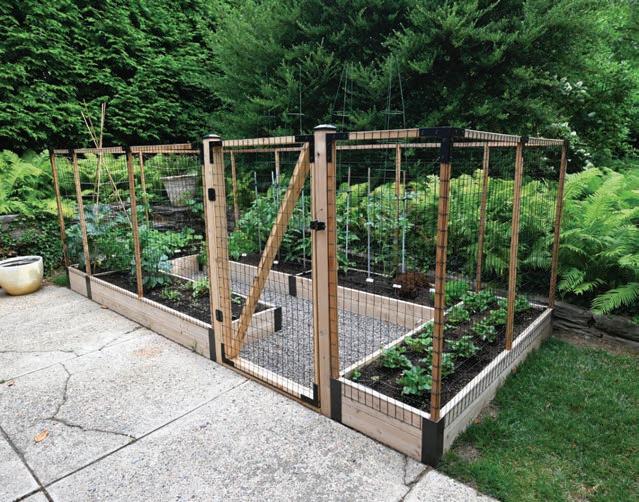
5. Accessibility and Convenience
The best time to observe how water behaves on your property is during a heavy storm. Keep an eye out for gullies that carry stormwater, low points with puddles or dead grass, and runoff from hardscaping and walkways. By anticipating and mitigating potential water-related issues, you create an environment where your garden can flourish stress-free.
4. Practicality and Aesthetics
Imagine gazing out your window and being greeted by a picturesque garden oasis. Choose a visible location to enhance your property's aesthetic appeal and encourage regular interaction with your garden. Ideally, your garden will become naturally integrated into your daily life. “Out of sight, out of mind” is real. People are less likely to interact with their garden if it’s not visible. Whether you're harvesting fresh produce for meals or admiring nature's beauty, embrace this opportunity to enjoy the magic of homegrown food.
Ask yourself these questions to understand how you will interact with your garden: How often do I visit this space in my yard? What rooms in my house face the garden? Which door do I use to enter the house? Placing your garden near frequently used entrances, such as the kitchen or back door, can also streamline tasks like harvesting and watering. This strategic positioning makes gardening a seamless part of your daily routine!
Accessibility is key to unlocking your garden's full potential. A garden that's easily reached and visible from your home invites frequent visits and effortless maintenance. Building on flat ground in an accessible and visible area provides the best experience.
Stairs and uneven terrain pose safety concerns during construction and will make daily maintenance complicated and frustrating. For example, a garden built into a slope might require installing a ramp or steps to access the garden easily and safely and make it hard to maintain.
To ensure that everyone can enjoy your garden easily, keep pathways clear and terrain manageable in dry and wet weather. Examples of rough terrain include mud and rocks. Ideally, you should be able to visit your garden in bare feet. While you can install pathways to and from your garden, building a garden shouldn’t disrupt your landscape, and visiting it shouldn’t feel treacherous.
Planning a raised bed vegetable garden is a journey tailored to your unique landscape. By considering factors like sunlight, water, location, visibility and accessibility, you pave the way for a flourishing space teeming with life and vitality. So roll up your sleeves and take the next step toward a successful garden!
Chris Mattingly is the founder of Backyard Eats, a full-service food gardening business with an array of offerings in the greater Philadelphia area. Email him at chris@backyard-eats.com or visit www.backyard-eats.com
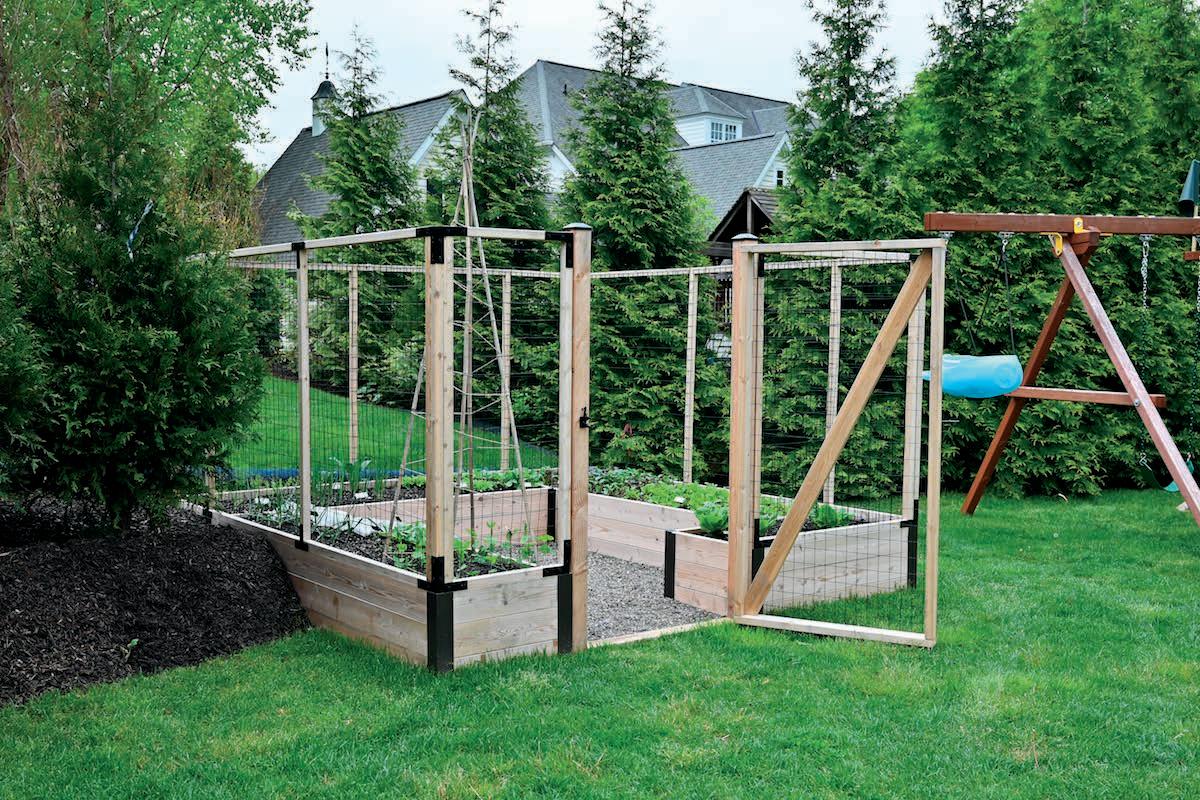

20 THE SHUTTLE April 2024
HOMEGROWN FOOD
EASY
a community of over 500 gardeners and find success with proven garden design, installation, and maintenance services! backyard-eats.com (223) 203-8533 @backyardeatsphl
MADE
Join
Susan Schaefer
Artists in Our Aisles

I recently returned to my hometown of Philadelphia, where I continue my work as principal of Schaefer Communications, a contributing columnist for PBS’ online magazine, Next Avenue, and the Broad Street Review. I co-founded and edited Philadelphia’s beloved bi-weekly, The South Street Star, which ceased publication in 1988. As an undergraduate, graduate and adjunct faculty member of Temple University, my most cherished honor is the Distinguished Humanities Award, which acknowledges intellectual achievement and the integration of a liberal education with social responsibility.
I use fine art collage to gather and glue diverse elements according to the rules of line, form, color, repetition and value to create an aesthetic whole. In “My Lost Yiddish Civilization” series, I constructed a remembrance of my lost Yiddish ancestry and culture using archival family photographs, ink drawings on paper, fine art papers, found papers and newsprint. In my piece “Engineered to a Higher Standard,” my choice of images, colors and papers reflects the rich spirit of African Americans and their heritage and lives. My collage and photography are included in various book collections, group and solo shows.
SUBMISSIONS NEEDED
We want to feature your art in the Shuttle!
Please submit the following to Richard Metz (thembones2@hotmail.com):
• Two 4” x 6” high-resolution images (300 dpi)
• A short statement about the work
• A short bio
• A headshot

• A link to a website if you have one

Weavers Words
An Awakening
Most of us are stronger than we think, more resilient than we can imagine, more vulnerable than we care to admit.
When we realize this within ourselves and each other, we begin the shift toward our common humanity and away from human commodity.
This is what gives empathy its power, kindness its strength.
—Alma Sojourner Wynne
The Poet’s Lariat
Let me speak to you now
Of the poet's lariat.
That rounds up words and phrases,
So that the cowboy wordsmith can twist and turn them, and put them through their paces.
And can coax, cajole and manipulate syllables and syntax, Till we (not unlike the bull and the rodeo crowd) turn our attention to the clown.
—Frank Hollick
Our Revised Submission Guidelines:
1. Original poems must be of a reasonable length. Lengthy poems that are the subject of a reflection will be excerpted.
2. The Shuttle editor has the final say as to whether a poem or reflection is suitable for publication.
3. The number of poems or reflections in an issue is determined by the amount of space available.
4. Members and nonmembers are welcome to submit.
5. Email your submissions to editor@weaversway.coop and put “Poetry submission (or reflection) for Shuttle” in the subject line.
just a question do you say mankind, or do you say humankind? and what
oh what
oh what is the difference?
—Heather Cohen
One
You ever just want to hug the world, twist your body up towards the sky and sprout arms with leaves like a tree, sway easy like tall grass in the wind, burst joy from your face like a newly bloomed sunflower, croak deep within your throat like a frog, swell your belly like a blowfish, roll in the ocean with the waves, become one with the rising sun, connect with all things living at once, and transform into an infinite energy source, shooting up into the unknown and after ten thousand years or so, come soaring back down to earth, as a newborn baby’s soul?
—Sharon DuPree
April 2024 THE SHUTTLE 21
Imagining a World Without Waste
Weavers Way to Take CRP Program In-House
This month, Weavers Way will approach its third year of offering a reusable, deposit-based container system. Co-op shoppers who have chosen the waste-free, circular reuse system over its single-use counterpart have collectively prevented the creation of more than 23,000 plastic containers. ECHO Systems has worked with the Co-op to design, launch and maintain the system by offering weekly collections and sanitization services and has workded with with Co-op leadership and staff to deliver a fully functional reuse system.
Earlier this year, the Co-op hired its first official sustainability coordinator, Danielle Mitchell, who now oversees the Container Refund Program. Over the next few months, warewashing company Re:Dish of Port Richmond, will take over wash services for Weavers Way.
The Co-op is adopting several new internal protocols to ensure the consistency of CRP offerings on the shelves across each of its locations. These protocols are intended to grow the CRP program, which is a critical part of the Co-op’s goal of achieving a 40% reduction in single-use plastic by 2028. For the Co-op to achieve this goal, each location would need to sell approximately 167 reusable containers of products per week, which is completely attainable. Your purchase of products in CRP packaging will help achieve this goal.
Each week, ECHO collects 150 to 300 dirty containers for sanitization. We deeply appreciate everyone who has returned their pre-washed, reusable containers promptly. We are happy to take the rubber bands back, but there is no need to return the scale label. Those can be disposed of, we are looking to launch a new label soon that will be fully dissolvable and attached directly to the CRP container.
ECHO is honored to have worked with Weavers Way, and we look forward to providing our guidance and support in the coming months. Please take a moment to fill out the survey.* Thank you for your commitment to helping the Co-op improve its sustainability outcomes.
— Alisa Shargorodsky, ECHO Systems
Not All Plastics Are Bad: All About Biodegradables
A switch to biodegradable plastic where possible is another way to decrease forever plastic waste. Biodegradable plastics are not new; we encounter many of them every day.
Surgeons use biodegradable plastic sutures made from different plastics. Polylactic acid thread dissolves slowly and is used to hold tissue together, giving it a chance to heal. There are pharmaceutical dose regimes that are comprised of a drug dispersed in a biodegradable plastic matrix. As the plastic dissolves and gets metabolized, the drug is released.
Soluble plastic is used in some drug formulations to prevent the excretion of the drug and to maintain exposure so less of the drug has to be used. The creative use of plastic in pharmaceuticals is saving and improving lives.
Elmer’s glue, which is common in many classrooms and homes, is polymer (plastic) polyvinyl alcohol. PVA dissolves in water and is biodegradable. Using the existing technology mentioned above, chemists are working to design biodegradable plastic that can be mass produced to replace our current use of forever plastics.
Paper is a mix of plastic, clay and fiber. Synthetic, biodegradable AKD and ASA (Alkenyl Succinic Anhydride and Alkyl Ketone Dimer), starch and rosin work to hold paper together. Each of these plastics are biodegradable. Every manufacturer uses their own proprietary
*Please take a moment to scan the lower left QR code below and take the survey.

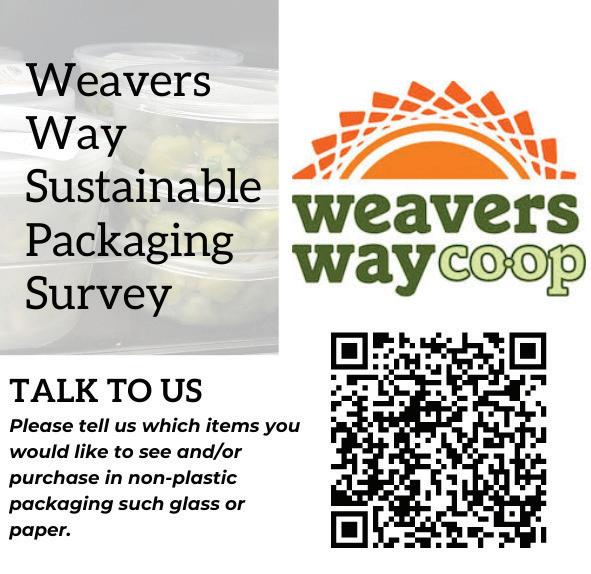


mix and there are different formulations based on the paper’s end use.
Of course, the best way to reduce plastic pollution is to refrain from using plastic when possible. At Weavers Way, you can bring your own jar, then tare it and fill it with the product of your choice in the bulk area. If you’re pressed for time or need a jar, there is a jar library available.
If you have extra jars, you can clean them, remove the label, and then drop off to the jar libraries for others to use. This helps save resources and keeps extra garbage out of the waste stream.
—Roy Eisenhandler
Keep in Mind These Jar Library Guidelines
● For any item you buy in bulk using your own container or one from the jar library, you will receive a 15-cent discount at the register.
● Tell the bulk staffer when you are dropping off your jars, so they can inspect them to see if they are appropriate for the library.
● Drop off clean, dry glass containers only — no plastic containers.
● Remove labels as much as possible. Volunteers maintain the jar library; the more labels there are to remove, the harder their job.
● Larger jars are especially appreciated, e.g. tomato sauce or quart-sized jars. Also, consider if the jar you’re donating would be useful.
● If the incoming jar box is full, please do not leave your jars. Currently there is no place to store surplus jars.


22 THE SHUTTLE April 2024
TOTAL SOLD TOTAL RETURNED RATE OF RETURN CONTAINER RETURN PROGRAM 24,143 15,469 64% Totals by Store: Ambler = 9,552 Chestnut Hill = 7,878 Mt. Airy = 6,721 Cumulative Total (as of March 23, 2024)
• FOOD RESIDUE • NO WRITING
PLEASE RETURN WITH: NO LABELS
A Silent Procession for Peace


More than 350 activists silently processed along Germantown Avenue on Feb. 25 with signs calling for a peaceful end to the Israeli-Palestinian conflict in Gaza. Messages on the signs included “There is another way,” “We grieve the loss of every child” and “Peace, Shalom, Salaam.” Some carried photos with the names of Israeli and Palestinian children who have been killed in the current conflict. Others carried bundles representing childsized body bags. The procession was organized by the local chapter of American Friends of Combatants for Peace and began and ended at Chestnut Hill Peace Park.
The Weavers Way Board of Directors represents members’ interests in the operation of the stores and the broader vision of the Co-op.
The Board’s regular monthly meeting is held on the first Tuesday of the month. Meetings are currently taking place online until


377 mkilpatrick@weaversway.coop
Prepared Foods
Alisa Consorto, ext. 374 aconsorto@weaversway.coop
Meat, Poultry and Seafood
Mike Lawrence, ext. 361 mlawrence@weaversway.coop
Floral Buyer
Mira Kilpatrick, ext. 377 mkilpatrick@weaversway.coop
Bulk Buyer Ross Beauchamp, ext. 380 rbeauchamp@weaversway.coop
Bakery
Jessica Isanski, ext.376 jisanski,@weaversway.coop
Wellness
Karen Palmer, ext. 350 kpalmer@weaversway.coop

Chestnut Hill 8424 Germantown Ave.
8 a.m.-8 p.m. 215-866-9150
Store Manager
Ann Marie Arment, ext. 212 aarment@weaversway.coop
Assistant Store Manager
Stacy McGinnis smcginnis@weaversway.coop
Front End Manager
Sherne Williams, ext. 215 swilliams@weaversway.coop
Grocery
Len Mears, ext. 217 lmears@weaversway.coop
Assistant Grocery Manager
Kriss Walker, ext. 217 kwalker@weaversway.coop
Produce
Mike Sarver, ext. 211 msarver @weaversway.coop
Prepared Foods
Ty Moore, ext. 218 tmoore@weaversway.coop
Meat, Poultry and Seafood
Ron Moore, ext. 205 rmoore@weaversway.coop
Bakery
Kim Hopson, ext. 217 khopson@weaversway.coop
Bulk John Reimers, ext. 217
jreimers@weaversway.coop
Next Door 8426 Germantown Ave. 9 a.m.-8
April 2024 THE SHUTTLE 23 DID YOU KNOW? You can read the Shuttle online. The Shuttle www.weaversway.coop/shuttle-online Become a Member Want to play a role in shaping your grocery store? Just complete a membership form in any store or online, make an equity investment, and you’re good to go! We ask new members to attend an orientation meeting to learn about our cooperative model. You’ll receive two hours of work credit for attending. We look forward to meeting you! NEW MEMBER ORIENTATION Wedneday, April 24 from 6:30-8pm. Summit Church, 6757 Greene Street To register visit: www.weaversway.coop/events Admin 215-843-2350 General Manager Jon Roesser, ext. 131 jroesser@weaversway.coop Chief Financial Officer Emmalee MacDonald, ext. 105 emacdonald@weaversway.coop Purchasing Director Norman Weiss, ext. 133 normanb@weaversway.coop HR Director Lauren Castro, ext. 132 hr@weaversway.coop IT Director David Chaplin-Loebell, ext. 127 IT@weaversway.coop Operations Manager Rick Spalek, ext. 101 rick@weaversway.coop Membership Manager Kirsten Bernal, ext. 119 member@weaversway.coop Retail Director Jess Beer, ext. 121 jbeer@weaversway.coop Comm. Programs Coordinator Nima Koliwad nkoliwad@weaversway.coop Farm Manager Alessandro Ascherio, ext. 325 farmer@weaversway.coop Facilities Manager Doug Keener, ext. 128 dkeener@weaversway.coop Admin (Ambler) 215-302-5550 Development Director Kathleen Casey kcasey@weaversway.coop Marketing Manager Rachel Coats, ext. 151 rcoats@weaversway.coop Executive Chef Bonnie Shuman, ext. 374 bonnie@weaversway.coop Ambler 217 E. Butler Ave. 8 a.m.-8 p.m. 215-302-5550 Store Manager Heather Wigley, ext. 300 hcarb@weaversway.coop Assistant Store Manager Karen Gemmell, ext. 379 kgemmell@weaversway.coop Grocery Nancy Timmons Melley, ext. 373 nmelley@weaversway.coop Assistant Grocery Manager Ken Kolasinski, ext. 380 kkolasinski@weaversway.coop Front End Manager Hillary Bond, ext. 375 hbond@weaversway.coop Produce Mira Kilpatrick, ext.
p.m. 215-866-9150, ext. 220/221 Wellness Manager Nicolette Giannantonio, ext. 221 ngiannantonio@weaversway.coop Mt. Airy 559 Carpenter Lane 8 a.m.-8 p.m. 215-843-2350 Store Manager Matt Hart, ext. 101 mhartt@weaversway.coop Grocery Keith Souder, ext. 140 ksouder@weaversway.coop Produce Shan Wichmann, ext. 107 swichmann@weaversway.coop Deli Sebastian Agudelo, ext. 134 sagudelo@weaversway.coop Prepared Foods John McAliley, ext. 102 jmcaliley@weaversway.coop Meat and Seafood Mike Lawrence, ext. 104 mlawrence@weaversway.coop Bulk Juli Cardamone, ext. 142 jcardamone@weaversway.coop Bakery Andrew Joyce, ext. 305 ajoyce@weaversway.coop Floral Buyer Ginger Arthur, ext. 317 floral@weaversway.coop Across the Way 608 - 610 Carpenter Lane 8 a.m.-8 p.m. 215-843-2350, ext. 6 Wellness Manager Sarah Risinger, ext. 114 srisinger@weaversway.coop Pet Department Manager Anton Goldschneider, ext. 276 petstore@weaversway.coop HOW TO REACH US
Weavers Way Board
further notice. Check the Co-op’s Calendar of Events for the date of the next meeting. For more information about Board governance and policies, visit www.weaversway.coop/board. Board members’ email addresses are at www.weaversway.coop/board-directors, or contact the Board Administrator at boardadmin@ weaversway.coop or 215-843-2350, ext. 118. 2023-2024 Weavers Way Board of Directors President: Cheryl Croxton Vice President: Joshua Bloom Treasurer: Gail McFadden-Roberts Secretary: Jason Henschen
Hillary Baum,
Haskins-Simms, Benjamin Bartley, Michael Hogan, DeJaniera B. Little, Kacy Manahon, Esther Wyss-Flamm. The Shuttle Editor: Karen Plourde editor@weaversway.coop, 215-843-2350, ext. 135 Art Director: Annette Aloe annette@weaversway.coop, 215-843-2350, ext. 130 Advertising Coordinator: Karen Plourde advertising@weaversway.coop, 215-843-2350, ext. 135 Proofreaders this issue: Connie Garcia-Barrio, Kat Riley, Melanie & Lew Goodman Contributors this issue: The Weavers Way Leadership Committee, the Board of Directors of Food Moxie, Kiersten Bernal, Kieran McCourt, Karen Palmer, Pete Merzbacher, Liz Hersh, Jon Roesser, Boris Kerzner, Ruffian Tittmann, Coleman Poses, Betsy Teutsch, Adrienne Carpenter, Erin Landis, Andrew Bunting, Rosa Lewis, Sandy Folzer, Marsha Low, Norman Weiss, Chris Mattingly, Alisa Shargorodsky, Roy Eisenhandler, Alli Katz. w ww.weaversway.coop contact@weaversway.coop What’s What & Who’s Who at Weavers Way Catering: cateringMA@weaversway.coop, cateringAB@weaversway.coop, cateringCH@weaversway.coop Preorders: MApreorder@weaversway.coop, CHpreorder@weaversway.coop, ABpreorder@weaversway.coop Advertise in the Shuttle Affordable and Effective advertising@weaversway.coop Locally Grown llustration by Alli Katz
At-Large:
Kristin
Photos by Rivkah Walton©
Celebrate Earth Month
Morris Arboretum & Gardens has nature-focused tours, talks, and events all April long!

TOURS
All tours free with general admission; weather permitting
Garden Highlights Tour
WEEKDAYS AT 10:30 AM & WEEKENDS AT 1 :00 PM
Spring Buds & Blossoms Tour
SATURDAY, APRIL 13, 2024 AT 11:00 AM
Magnolias & More Tour
SATURDAY, APRIL 20, 2024 AT 11:00 AM
SPECIAL EVENT
Fostering Resiliency
Helping our Forests and Wildlife
Respond to a Rapidly Changing Climate
THURSDAY, APRIL 18, 2024 12:00-1:30 PM
Virtual, hosted on Vimeo. Advance registration required. This free moderated panel discussion brings together forward-thinking experts from the University of Pennsylvania and beyond to shed light on strategies to foster resiliency among our native trees, birds, and mammals.
BOOK TALK AND SIGNING
Private Gardens of Philadelphia
Virtual Book Talk
THURSDAY, APRIL 25, 2024
7:00 PM
Members: $30
Non-members: $35

Author Nicole Juday will give us a look inside her gorgeous new book, Private Gardens of Philadelphia, highlighting 21 of our area’s rarely seen private gardens.
Private Gardens of Philadelphia
Book Purchase & Signing (In Person)
SATURDAY, APRIL 27, 2024
10:00 AM

$60 (includes a signed copy of the publication and Morris admission)
Join us in person for a celebratory launch of the first-ever coffee table book on Philadelphia’s spectacular private gardens!
And don’t miss…
FRIDAY, MAY 31, 2024
8:30 AM – 4:30 PM
$150/registrant; $80 for students
The general public is invited to attend either in person or virtually as we bring together a panel of plant scientists and conservation experts for an intensive one-day conference that highlights the intersection of plant science and conservation.
morrisarboretum.org
100 E. Northwestern Avenue Philadelphia, PA 19118
215-247-5777







































































































